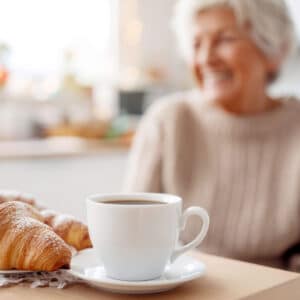 Stay Steady, Engaged & Confident in the Winter Months
Stay Steady, Engaged & Confident in the Winter Months
As the year winds down, daylight hours grow shorter, evenings come earlier, and routines often shift. For many older adults, tasks that once felt simple can require a little more care and planning. But with a bit of preparation, the right routines, and maybe a helping hand or two, you can make this season one of safety, connection, and joy.
That’s where Seniors Helping Seniors® can help. That’s why we’ve gathered a few practical safety tips to help you, or someone you love, stay steady, positive, and connected through the darker months ahead. With a few thoughtful adjustments and supportive habits, you can stay active, confident, and connected no matter how early the sun sets.
Understanding the Impact of Shorter Days on Older Adults
When daylight fades earlier, visibility decreases which can make it easier for seniors to miss steps, trip over obstacles, or feel less steady. The change in lighting can also affect sleep, mood, and social routines. But with awareness and a few simple strategies, these challenges can be turned into opportunities for comfort and connection.
Our Seniors Helping Seniors® caregivers are here to help you stay safe and supported, offering an extra hand or friendly companion whenever you need it.
7 Everyday Tips to Stay Safe and Comfortable
- Improve Indoor Lighting: Keep your home bright and easy to navigate. Use brighter bulbs in areas where you read, cook, or move around often. Add nightlights to hallways, bathrooms, and entryways so you can see clearly after dark.
- Plan Activities During Daylight Hours: Try to schedule errands, walks, or appointments earlier in the day when natural light is strongest. If you prefer company or need a ride, a Seniors Helping Seniors® caregiver can help plan and accompany you on your outings.
- Keep Walkways Clear and Visible: Check that all walking paths in and around your home are free of clutter and well lit. Replace or adjust light fixtures that create shadows, and make sure rugs or cords aren’t in your way.
- Stay Physically Active: Regular movement helps maintain strength, balance, and confidence. Gentle stretching, light exercise, or even walking around your home can keep you feeling steady and energized.
- Maintain a Consistent Daily Routine: When daylight changes, it can be easy to lose track of time or sleep patterns. Aim to wake up, eat meals, and go to bed around the same times each day to keep your body and mind balanced.
- Check Your Vision and Home Setup: Small vision changes can make a big difference in low light. Schedule regular eye exams and ensure glasses or contacts are up to date.
- Stay Social and Connected: Shorter days can sometimes bring feelings of loneliness or disconnection. Staying socially engaged is just as important for well-being as physical safety. Schedule regular calls or visits with family and friends; or spend time with a Seniors Helping Seniors® caregiver who brings both companionship and support.
Your Partner in Safety and Support
Shorter days don’t have to dim your sense of joy or independence. With a few thoughtful habits and the right support, you can feel confident, comfortable, and connected all season long. Seniors Helping Seniors® caregivers offer care, companionship, and encouragement that brighten your days and bring peace of mind. Contact your local office today to learn how we can help you or a loved one stay safe, comfortable, and connected at home.
The post 7 Tips for Seniors to Stay Safe, Active & Connected as Days Grow Shorter appeared first on Seniors Helping Seniors.



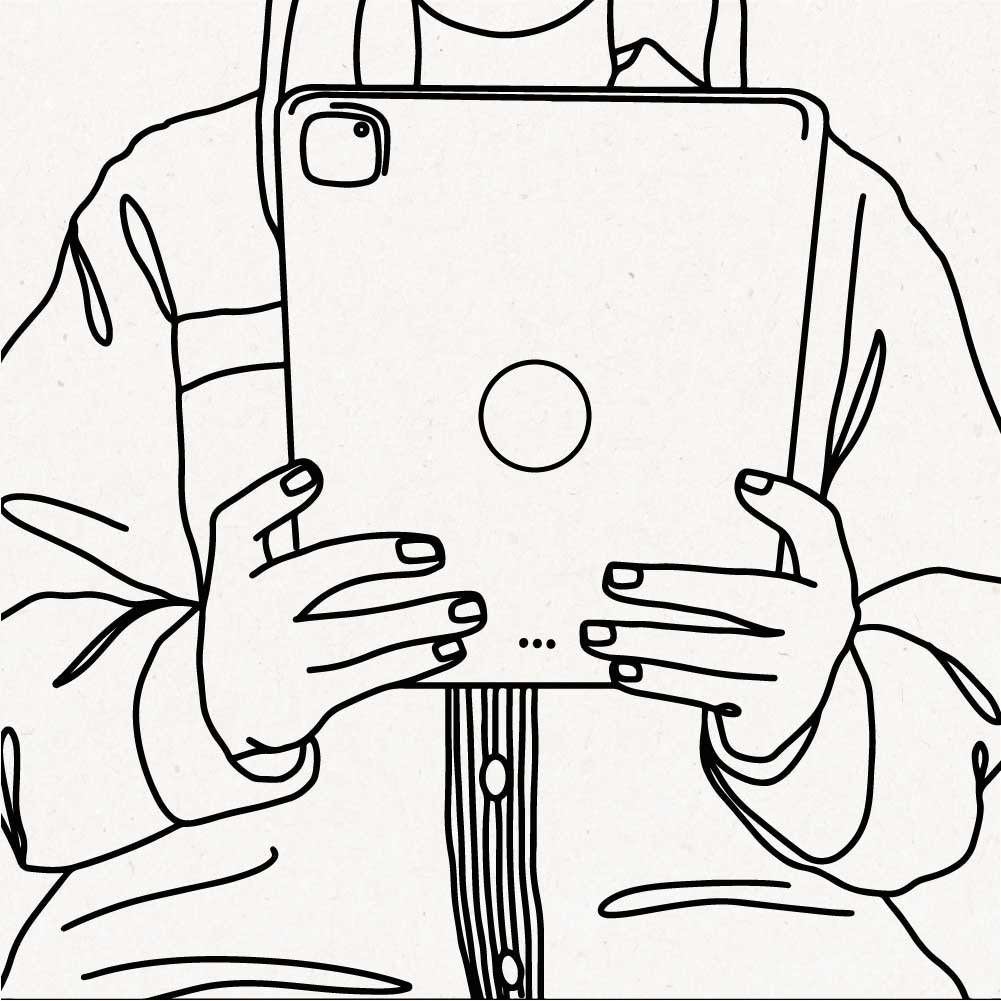




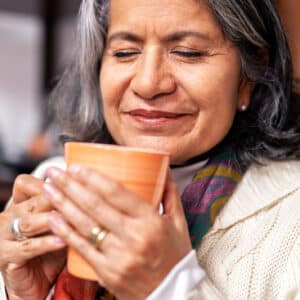 Hydration Meets Comfort This Fall
Hydration Meets Comfort This Fall Autumn Adventures Are Just a Tap Away
Autumn Adventures Are Just a Tap Away Seniors, Embrace Wellness This August
Seniors, Embrace Wellness This August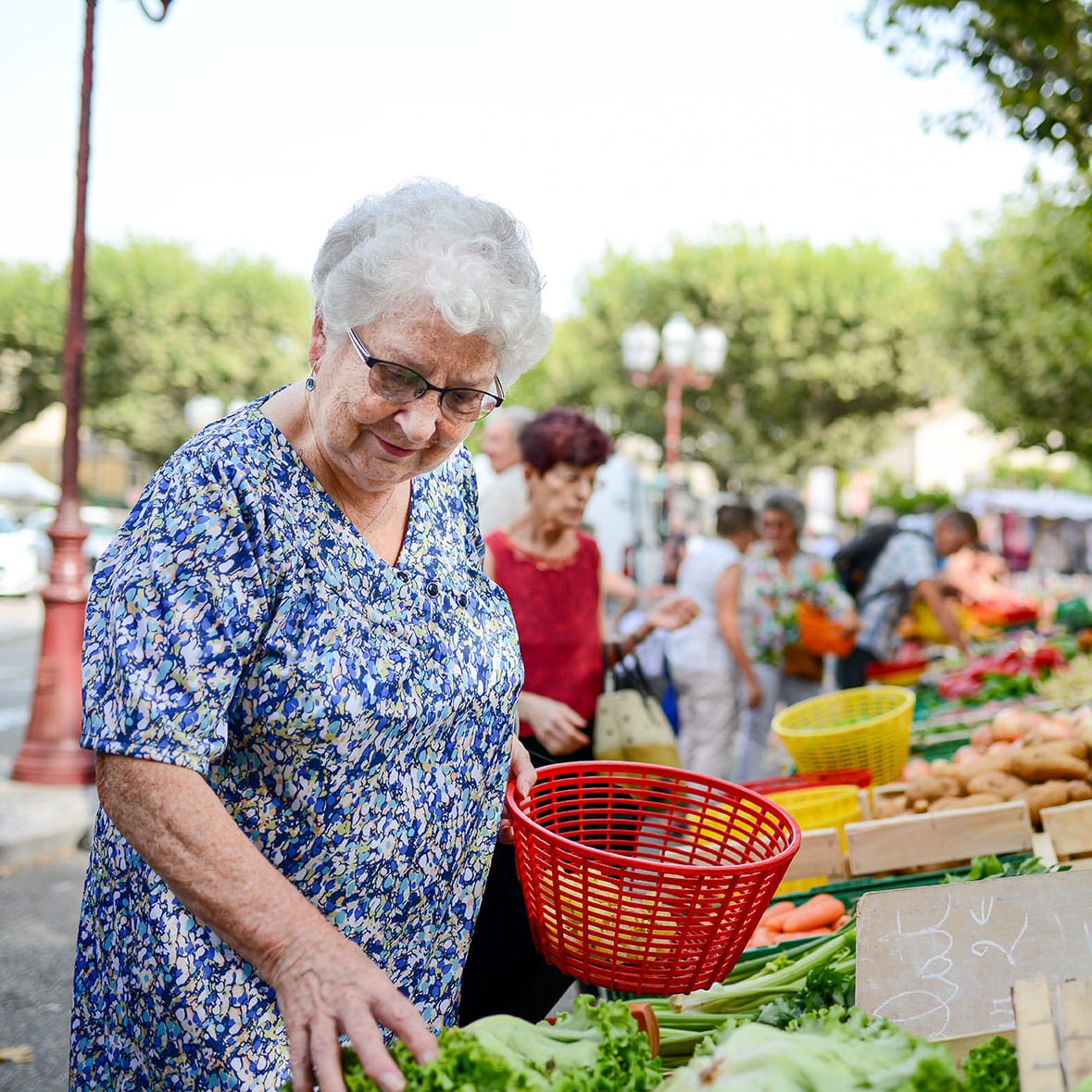 National Farmers Market Week (August 4-10) is the perfect invitation to embrace wellness. It’s the perfect time for seniors to reconnect with their community and enjoy an outing that’s as nourishing for the spirit as it is for the body. With a compassionate Seniors Helping Seniors® caregiver from providing a ride and companionship, a wonderful trip to the market is always possible. Keep reading to discover the wonderful benefits of a market visit and tips for making the most of your day.
National Farmers Market Week (August 4-10) is the perfect invitation to embrace wellness. It’s the perfect time for seniors to reconnect with their community and enjoy an outing that’s as nourishing for the spirit as it is for the body. With a compassionate Seniors Helping Seniors® caregiver from providing a ride and companionship, a wonderful trip to the market is always possible. Keep reading to discover the wonderful benefits of a market visit and tips for making the most of your day.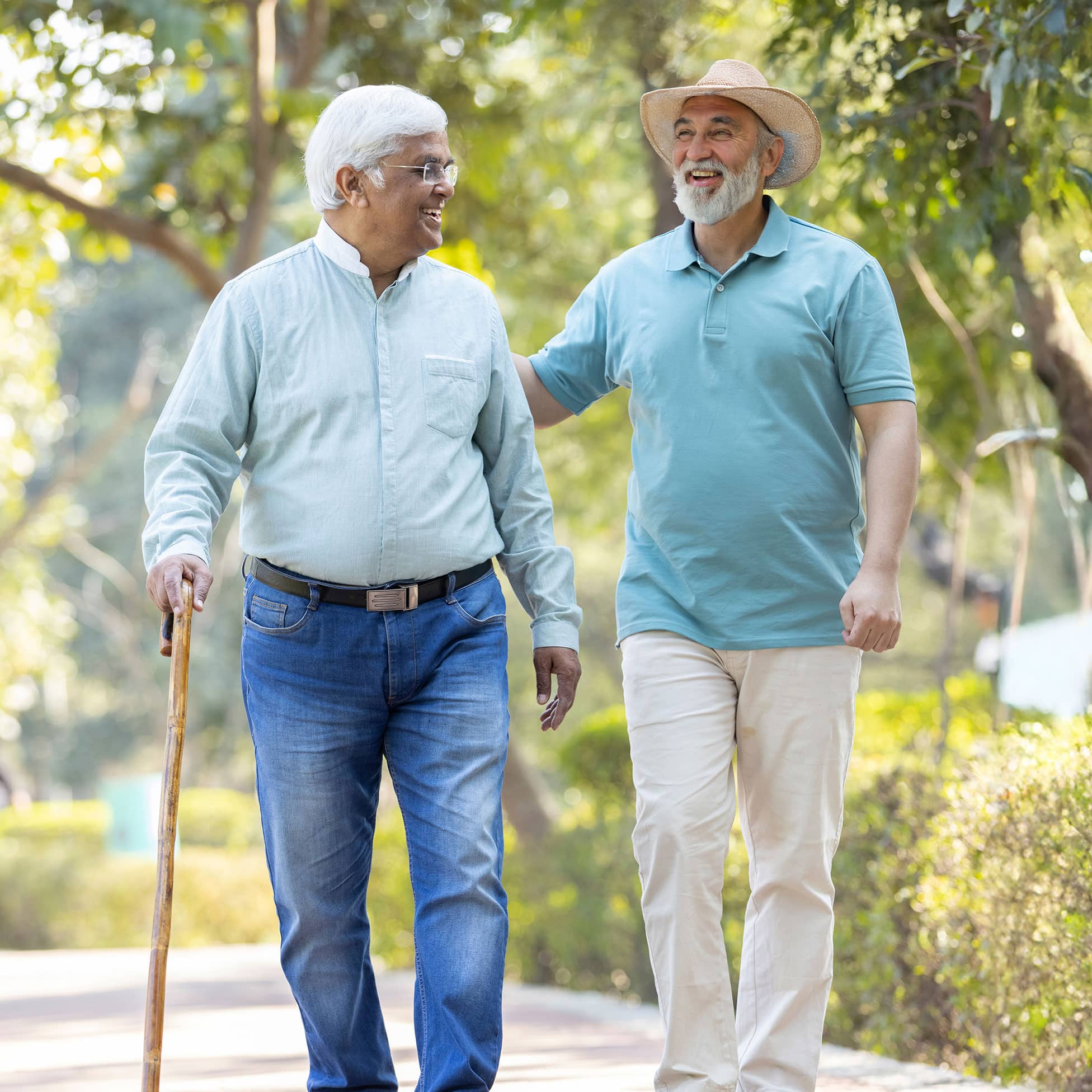 July is National Anti-Boredom Month. For our senior loved ones, especially those spending more time at home, boredom can sometimes creep in, turning quiet moments into feelings of loneliness or disinterest. It’s more than just “having nothing to do” – a lack of engagement can truly impact an older adult’s well-being. This special month highlights the importance of engagement and meaningful activity in boosting spirits and maintaining overall health. In this Seniors Helping Seniors® blog, we’ll discuss why combating boredom is crucial for senior well-being and offer inspiring ideas to help your loved one stay engaged, vibrant, and connected all year long.
July is National Anti-Boredom Month. For our senior loved ones, especially those spending more time at home, boredom can sometimes creep in, turning quiet moments into feelings of loneliness or disinterest. It’s more than just “having nothing to do” – a lack of engagement can truly impact an older adult’s well-being. This special month highlights the importance of engagement and meaningful activity in boosting spirits and maintaining overall health. In this Seniors Helping Seniors® blog, we’ll discuss why combating boredom is crucial for senior well-being and offer inspiring ideas to help your loved one stay engaged, vibrant, and connected all year long. The Fourth of July is here, seniors! We’re excited for patriotic parades, delicious backyard barbecues, and of course lively firework shows. While these spectacular displays are a highlight of the holiday, the celebratory sounds can present a challenge for mature adults with sensitive hearing. The Seniors Helping Seniors® team wants to ensure your loved ones can comfortably enjoy the festivities. That’s why we’ve put together simple tips to protect their ears and offer alternative ways to celebrate, ensuring everyone has a safe and happy Independence Day. Keep reading for our full guide to senior hearing protection this Fourth of July.
The Fourth of July is here, seniors! We’re excited for patriotic parades, delicious backyard barbecues, and of course lively firework shows. While these spectacular displays are a highlight of the holiday, the celebratory sounds can present a challenge for mature adults with sensitive hearing. The Seniors Helping Seniors® team wants to ensure your loved ones can comfortably enjoy the festivities. That’s why we’ve put together simple tips to protect their ears and offer alternative ways to celebrate, ensuring everyone has a safe and happy Independence Day. Keep reading for our full guide to senior hearing protection this Fourth of July. Namaste seniors! The Seniors Helping Seniors® team is excited to shine a light on International Yoga Day this June. Yoga is a gentle, low-impact form of physical and mental exercise that improves strength, flexibility, balance, and peace of mind at any age. Whether you’re looking to improve your balance, strengthen your core, or simply enjoy a few quiet moments of mindfulness, yoga is a fantastic option. It’s non-strenuous, adaptable to all mobility levels, and can even be done in a chair. From easing joint pain to reducing stress, yoga encourages movement that feels good and supports your overall well-being.
Namaste seniors! The Seniors Helping Seniors® team is excited to shine a light on International Yoga Day this June. Yoga is a gentle, low-impact form of physical and mental exercise that improves strength, flexibility, balance, and peace of mind at any age. Whether you’re looking to improve your balance, strengthen your core, or simply enjoy a few quiet moments of mindfulness, yoga is a fantastic option. It’s non-strenuous, adaptable to all mobility levels, and can even be done in a chair. From easing joint pain to reducing stress, yoga encourages movement that feels good and supports your overall well-being. Happy National Best Friends Day from all of us at the Seniors Helping Seniors® team! This special day is the perfect opportunity to celebrate the friendships that bring us joy, laughter, and love; especially the kind that grow between seniors and caregivers. At its core, our mission is about genuine connection. We’ve seen time and again how a supportive Seniors Helping Seniors® caregiver can become a trusted companion, creating a bond that uplifts both individuals and enriches daily life. For many seniors, having a friend they can count on makes all the difference in staying active, engaged, and emotionally well.
Happy National Best Friends Day from all of us at the Seniors Helping Seniors® team! This special day is the perfect opportunity to celebrate the friendships that bring us joy, laughter, and love; especially the kind that grow between seniors and caregivers. At its core, our mission is about genuine connection. We’ve seen time and again how a supportive Seniors Helping Seniors® caregiver can become a trusted companion, creating a bond that uplifts both individuals and enriches daily life. For many seniors, having a friend they can count on makes all the difference in staying active, engaged, and emotionally well.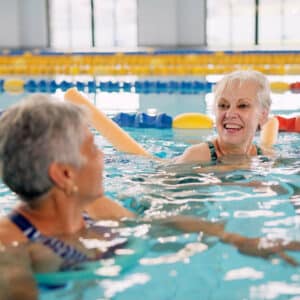 On the last Wednesday of May, thousands of older adults across the country participate in National Senior Health & Fitness Day. This day encourages seniors to make fitness a part of their lives, with fun, low-pressure activities designed to keep you moving. The Seniors Helping Seniors® team sees it as a joyful reminder that taking care of your body and mind is always a good idea and is always worth celebrating. From walking and swimming to gentle stretching, there are plenty of gentle ways to get in some movement that feels good and helps keep you strong, healthy, and independent. Keep reading for our top exercise ideas for seniors to try out on National Senior Health & Fitness Day.
On the last Wednesday of May, thousands of older adults across the country participate in National Senior Health & Fitness Day. This day encourages seniors to make fitness a part of their lives, with fun, low-pressure activities designed to keep you moving. The Seniors Helping Seniors® team sees it as a joyful reminder that taking care of your body and mind is always a good idea and is always worth celebrating. From walking and swimming to gentle stretching, there are plenty of gentle ways to get in some movement that feels good and helps keep you strong, healthy, and independent. Keep reading for our top exercise ideas for seniors to try out on National Senior Health & Fitness Day.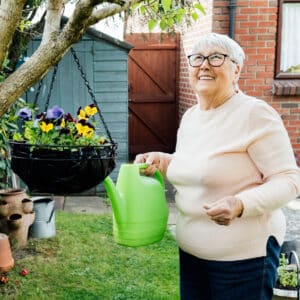 As springtime blossoms, digging into the joys of gardening is a great way to welcome the season. Many seniors can find comfort and peace in the process of planting a seed and watching it grow. For older adults, gardening is more than just a relaxing pastime. It’s a delightful way to stay active, enjoy the fresh air, and brighten each day with purpose. Whether you have a spacious backyard or just a sunny windowsill, this fun and accessible hobby can be easily adapted to your space and ability. In this Seniors Helping Seniors® blog, we’ll discuss how gardening supports healthy aging and share tips to help you, or your loved one, create a manageable garden that brings color and joy to everyday life.
As springtime blossoms, digging into the joys of gardening is a great way to welcome the season. Many seniors can find comfort and peace in the process of planting a seed and watching it grow. For older adults, gardening is more than just a relaxing pastime. It’s a delightful way to stay active, enjoy the fresh air, and brighten each day with purpose. Whether you have a spacious backyard or just a sunny windowsill, this fun and accessible hobby can be easily adapted to your space and ability. In this Seniors Helping Seniors® blog, we’ll discuss how gardening supports healthy aging and share tips to help you, or your loved one, create a manageable garden that brings color and joy to everyday life.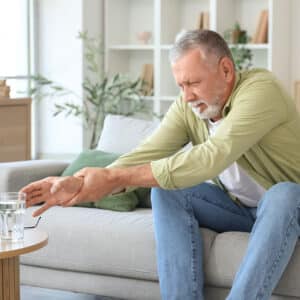 Aging comes with its fair share of challenges. Health concerns, changes in routines, and everyday worries add up, making stress common for many seniors. If you’re feeling overwhelmed, know that you’re not alone. April is Stress Awareness Month, a gentle reminder to put your well-being first. While a little stress is good for the body, too much can leave you feeling exhausted and anxious. Whether it’s a racing mind at bedtime, tension in your shoulders, or feeling overwhelmed by the “what ifs,” stress has a sneaky way of creeping in. The key is finding small, manageable ways to invite more calm into your daily life. From simple relaxation techniques to leaning on a trusted companion, there are plenty of ways to de-stress and feel your best.
Aging comes with its fair share of challenges. Health concerns, changes in routines, and everyday worries add up, making stress common for many seniors. If you’re feeling overwhelmed, know that you’re not alone. April is Stress Awareness Month, a gentle reminder to put your well-being first. While a little stress is good for the body, too much can leave you feeling exhausted and anxious. Whether it’s a racing mind at bedtime, tension in your shoulders, or feeling overwhelmed by the “what ifs,” stress has a sneaky way of creeping in. The key is finding small, manageable ways to invite more calm into your daily life. From simple relaxation techniques to leaning on a trusted companion, there are plenty of ways to de-stress and feel your best.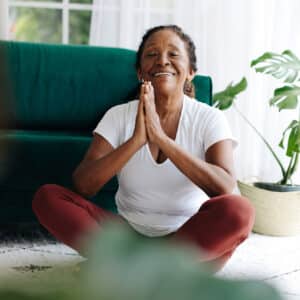 April is Parkinson’s Awareness Month, a time to educate, support, and empower those living with Parkinson’s disease. Whether you or a loved one have been touched by this disease, know that you’re not alone. With Parkinson’s, you know that every day comes with unique challenges, but also opportunities to find joy, connection, and strength. The Seniors Helping Seniors® team is honored to provide compassionate, one-on-one support that brings stability, confidence, and connection to those living with this movement disorder. This month, we celebrate their strength and share practical ways to help navigate the journey with grace, dignity, and joy.
April is Parkinson’s Awareness Month, a time to educate, support, and empower those living with Parkinson’s disease. Whether you or a loved one have been touched by this disease, know that you’re not alone. With Parkinson’s, you know that every day comes with unique challenges, but also opportunities to find joy, connection, and strength. The Seniors Helping Seniors® team is honored to provide compassionate, one-on-one support that brings stability, confidence, and connection to those living with this movement disorder. This month, we celebrate their strength and share practical ways to help navigate the journey with grace, dignity, and joy. Recognized every March, American Red Cross Month draws attention to the organization’s humanitarian work and commitment to communities around the world in times of crisis. With over 65,000 crisis responses each year, the Red Cross reminds us all—especially seniors—of the importance of emergency preparedness. Seniors can take proactive measures to prepare for unexpected situations by having a well-stocked emergency kit at home. To help you get started, the Seniors Helping Seniors® team has created an easy-to-follow guide to help you in gathering the essentials for an effective emergency kit.
Recognized every March, American Red Cross Month draws attention to the organization’s humanitarian work and commitment to communities around the world in times of crisis. With over 65,000 crisis responses each year, the Red Cross reminds us all—especially seniors—of the importance of emergency preparedness. Seniors can take proactive measures to prepare for unexpected situations by having a well-stocked emergency kit at home. To help you get started, the Seniors Helping Seniors® team has created an easy-to-follow guide to help you in gathering the essentials for an effective emergency kit.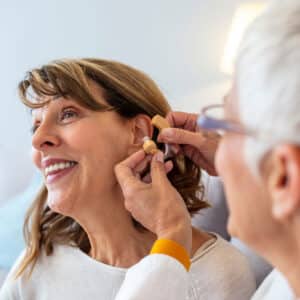 Have you heard? Today is World Hearing Day. This annual awareness campaign, led by the World Health Organization, highlights the importance of protecting your hearing and recognizing early signs of hearing loss. It’s the perfect time to talk about ear health and why protecting your hearing matters for seniors. According to Johns Hopkins Medicine, about 1 in 3 adults between 65 and 74 experience some form of hearing loss. But because symptoms appear gradually, many seniors don’t realize the changes right away.
Have you heard? Today is World Hearing Day. This annual awareness campaign, led by the World Health Organization, highlights the importance of protecting your hearing and recognizing early signs of hearing loss. It’s the perfect time to talk about ear health and why protecting your hearing matters for seniors. According to Johns Hopkins Medicine, about 1 in 3 adults between 65 and 74 experience some form of hearing loss. But because symptoms appear gradually, many seniors don’t realize the changes right away.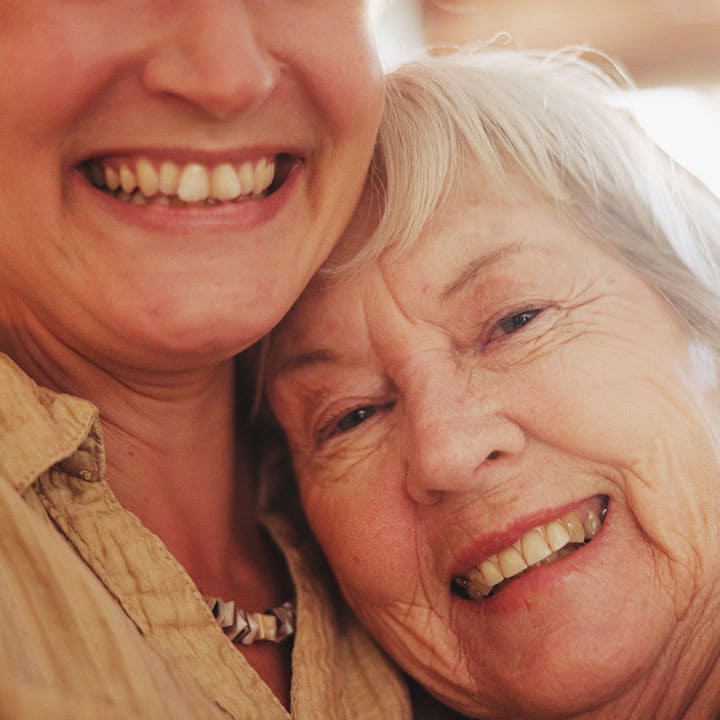 Today, we celebrate the heart and soul of the Seniors Helping Seniors® team: our incredible caregivers! National Caregivers Day is a moment to recognize these compassionate individuals who pour their hearts into supporting seniors and their loved ones. Whether preparing meals, lending a listening ear, or offering companionship, they’re more than caregivers—they’re trusted friends who empower seniors to thrive at home.
Today, we celebrate the heart and soul of the Seniors Helping Seniors® team: our incredible caregivers! National Caregivers Day is a moment to recognize these compassionate individuals who pour their hearts into supporting seniors and their loved ones. Whether preparing meals, lending a listening ear, or offering companionship, they’re more than caregivers—they’re trusted friends who empower seniors to thrive at home. Your heart is one of your body’s hardest-working muscles. It pumps oxygen-rich blood to all your vital organs, keeping them functioning properly. Recognized each February, American Heart Month reminds seniors just how important it is to keep their hearts in tip-top shape. Now is the perfect time to check in with your ticker and adopt simple, healthy habits that can lower your risk of heart disease and keep your heart strong. The Seniors Helping Seniors® team has put together a list of easy-to-follow tips that’ll help you stay heart-smart all year long. Continue reading for our advice to keep your heart in rhythm this month and beyond.
Your heart is one of your body’s hardest-working muscles. It pumps oxygen-rich blood to all your vital organs, keeping them functioning properly. Recognized each February, American Heart Month reminds seniors just how important it is to keep their hearts in tip-top shape. Now is the perfect time to check in with your ticker and adopt simple, healthy habits that can lower your risk of heart disease and keep your heart strong. The Seniors Helping Seniors® team has put together a list of easy-to-follow tips that’ll help you stay heart-smart all year long. Continue reading for our advice to keep your heart in rhythm this month and beyond. The internet is an incredible tool for staying connected, informed, and entertained, but it’s not without its risks—especially for seniors. Cybercriminals often target older adults with scams, phony emails, and other online threats. Staying safe online doesn’t require technical expertise—just a little awareness and a few simple precautions.
The internet is an incredible tool for staying connected, informed, and entertained, but it’s not without its risks—especially for seniors. Cybercriminals often target older adults with scams, phony emails, and other online threats. Staying safe online doesn’t require technical expertise—just a little awareness and a few simple precautions. Happy New Year! 2025 is here, and it’s the perfect time for seniors to prioritize health and wellness. Whether you’ve set big fitness goals or just want to feel your best, scheduling your annual health checkup is a fantastic first step for every senior. The Seniors Helping Seniors® team believes proactive care is the key to staying healthy and happy all year long.
Happy New Year! 2025 is here, and it’s the perfect time for seniors to prioritize health and wellness. Whether you’ve set big fitness goals or just want to feel your best, scheduling your annual health checkup is a fantastic first step for every senior. The Seniors Helping Seniors® team believes proactive care is the key to staying healthy and happy all year long. Winter’s cozy charm comes with shorter days and cooler weather—and for some seniors, it can bring Seasonal Affective Disorder (SAD). This winter-linked depression can dampen one’s mood, making it hard to enjoy the season’s comforts. The Seniors Helping Seniors® team is committed to helping your loved ones thrive no matter the season. Learn what SAD is, how it affects seniors, and our top tips for boosting spirits during winter’s chill.
Winter’s cozy charm comes with shorter days and cooler weather—and for some seniors, it can bring Seasonal Affective Disorder (SAD). This winter-linked depression can dampen one’s mood, making it hard to enjoy the season’s comforts. The Seniors Helping Seniors® team is committed to helping your loved ones thrive no matter the season. Learn what SAD is, how it affects seniors, and our top tips for boosting spirits during winter’s chill. The holidays have arrived, bringing winter weather, sparkling lights, and the quest for that perfect gift. Stumped on what to get the senior in your life? We’ve got you covered. The Seniors Helping Seniors® team has curated a list of thoughtful gift ideas for seniors. Whether they love exploring new hobbies, staying cozy, or just enjoying the festive season, you’ll find inspiration here. Keep reading to unwrap the best holiday gifts for seniors and make their season truly special!
The holidays have arrived, bringing winter weather, sparkling lights, and the quest for that perfect gift. Stumped on what to get the senior in your life? We’ve got you covered. The Seniors Helping Seniors® team has curated a list of thoughtful gift ideas for seniors. Whether they love exploring new hobbies, staying cozy, or just enjoying the festive season, you’ll find inspiration here. Keep reading to unwrap the best holiday gifts for seniors and make their season truly special!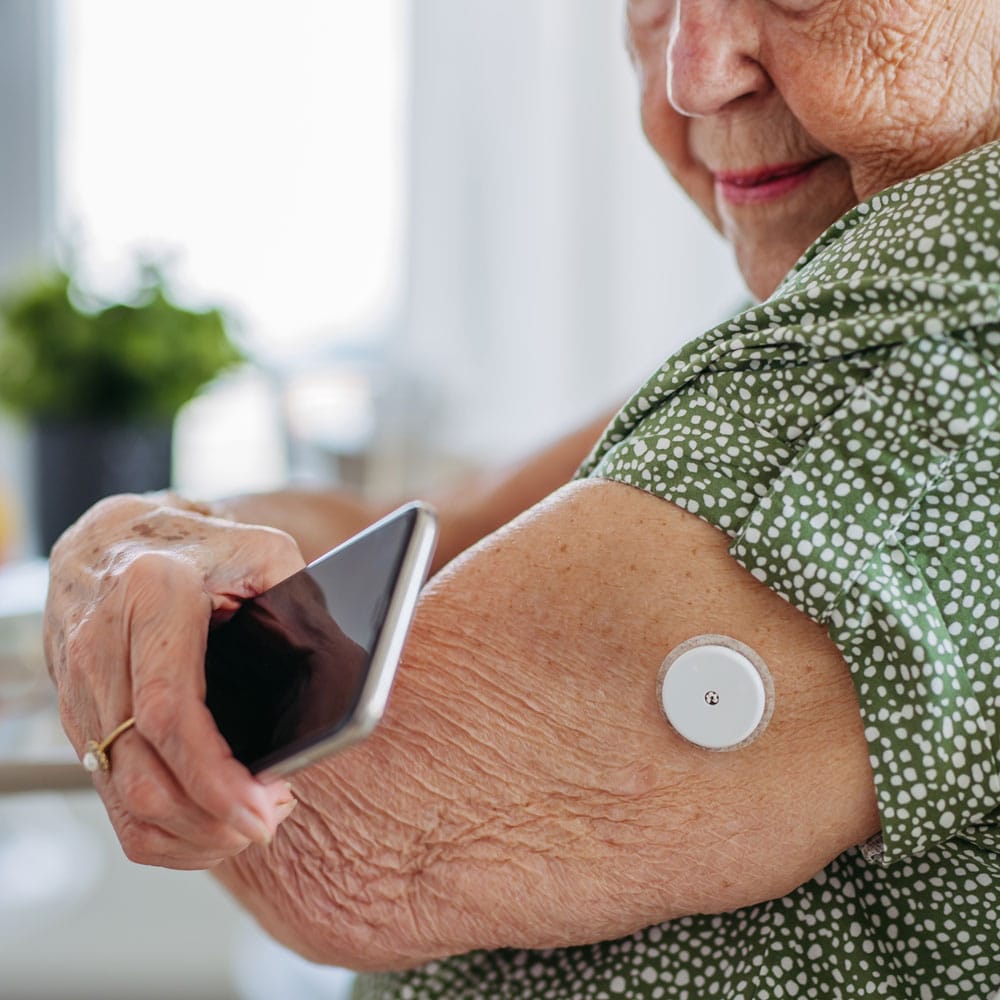 The holidays bring cherished time with loved ones, joyful gatherings, and, of course, plenty of delicious food. But for seniors managing diabetes, holiday treats and big meals can be a challenge. With holiday spreads often packed with carbs, sugars, and rich dishes, it can be tempting to let healthy routines slide. But you don’t have to opt out of the festivities completely.
The holidays bring cherished time with loved ones, joyful gatherings, and, of course, plenty of delicious food. But for seniors managing diabetes, holiday treats and big meals can be a challenge. With holiday spreads often packed with carbs, sugars, and rich dishes, it can be tempting to let healthy routines slide. But you don’t have to opt out of the festivities completely.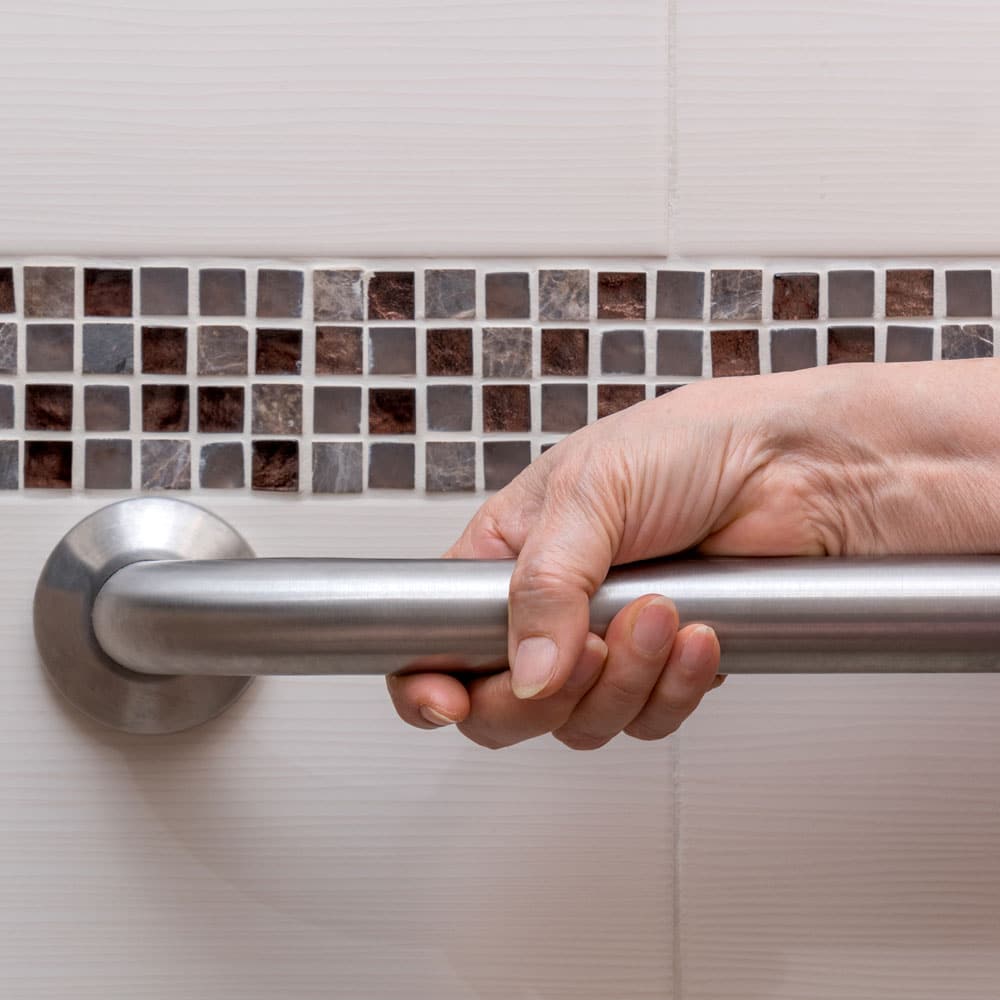 Tis the season for joy, togetherness, and… fall hazards for seniors. As the holidays approach, so do unique risks for falls that can make this time of year a little less merry for older adults. Festive lights, slick surfaces, and that extra holiday clutter can turn even familiar spaces into potential fall zones.
Tis the season for joy, togetherness, and… fall hazards for seniors. As the holidays approach, so do unique risks for falls that can make this time of year a little less merry for older adults. Festive lights, slick surfaces, and that extra holiday clutter can turn even familiar spaces into potential fall zones. Halloween isn’t just for kids; it’s a fantastic opportunity for seniors to embrace the fun and festivities of the season. The spooky holiday offers a wonderful opportunity for seniors to connect with family and friends through enjoyable activities that brighten their spirits. Whether it’s crafting seasonal decorations, baking delicious treats, or enjoying classic Halloween movies, there are countless ways to create lasting memories. The Seniors Helping Seniors® team came up with a list of thrilling ideas to help you have a hauntingly good time this Halloween.
Halloween isn’t just for kids; it’s a fantastic opportunity for seniors to embrace the fun and festivities of the season. The spooky holiday offers a wonderful opportunity for seniors to connect with family and friends through enjoyable activities that brighten their spirits. Whether it’s crafting seasonal decorations, baking delicious treats, or enjoying classic Halloween movies, there are countless ways to create lasting memories. The Seniors Helping Seniors® team came up with a list of thrilling ideas to help you have a hauntingly good time this Halloween.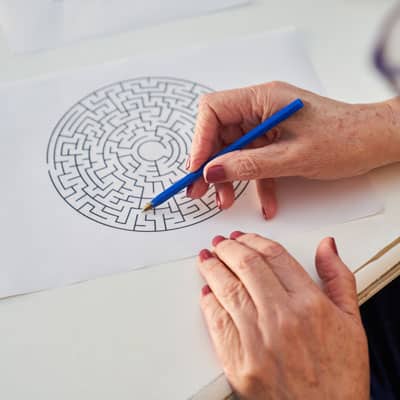 Fall is in the air, bringing with it pumpkin patch adventures, apple picking, baking sweet treats, and watching the leaves turn vibrant shades of red and gold. While this time of year offers plenty of seasonal excitement, it’s also important to focus on mental well-being—especially for seniors. The shorter days and cooler temperatures can disrupt daily routines, making it harder to stay active and get outside. The Seniors Helping Seniors® team understands these challenges and wants to help you stay happy and healthy this season. That’s why we’ve put together a list of simple tips to beat the seasonal blues. Keep reading for our advice on staying positive, active, and engaged this season.
Fall is in the air, bringing with it pumpkin patch adventures, apple picking, baking sweet treats, and watching the leaves turn vibrant shades of red and gold. While this time of year offers plenty of seasonal excitement, it’s also important to focus on mental well-being—especially for seniors. The shorter days and cooler temperatures can disrupt daily routines, making it harder to stay active and get outside. The Seniors Helping Seniors® team understands these challenges and wants to help you stay happy and healthy this season. That’s why we’ve put together a list of simple tips to beat the seasonal blues. Keep reading for our advice on staying positive, active, and engaged this season.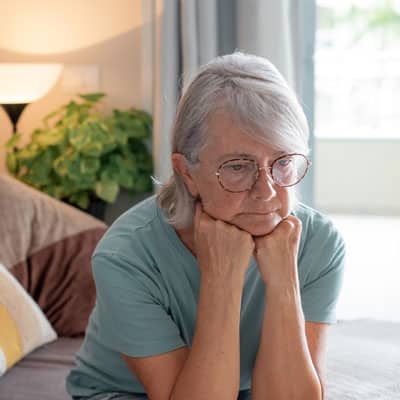 As the summer days fade and September welcomes a new season, many seniors find themselves adjusting to changing routines and shorter days. This shift can sometimes bring on feelings of social isolation, which can impact mental, emotional, and physical well-being. The Seniors Helping Seniors® team understands how challenging it can be to stay connected with loved ones, especially if they’re far away.
As the summer days fade and September welcomes a new season, many seniors find themselves adjusting to changing routines and shorter days. This shift can sometimes bring on feelings of social isolation, which can impact mental, emotional, and physical well-being. The Seniors Helping Seniors® team understands how challenging it can be to stay connected with loved ones, especially if they’re far away.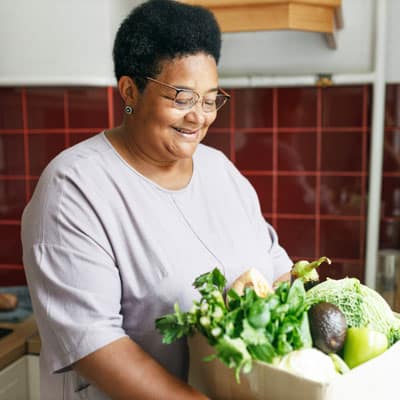 As fall arrives, we say farewell to the zesty, bright flavors of summer and embrace the warm, comforting tastes of autumn. Whether you’re a pumpkin spice enthusiast or a fan of fresh squash and zucchini from your local farmer’s market, there’s a fall recipe for every palate. This September, the Seniors Helping Seniors® team is here to help you enjoy the season with simple, healthy recipes that complement the cozy, cooler days. Read on to discover the benefits of a healthy fall diet for seniors and check out our top fall recipes!
As fall arrives, we say farewell to the zesty, bright flavors of summer and embrace the warm, comforting tastes of autumn. Whether you’re a pumpkin spice enthusiast or a fan of fresh squash and zucchini from your local farmer’s market, there’s a fall recipe for every palate. This September, the Seniors Helping Seniors® team is here to help you enjoy the season with simple, healthy recipes that complement the cozy, cooler days. Read on to discover the benefits of a healthy fall diet for seniors and check out our top fall recipes! August marks the end of carefree summer days and the beginning of the back-to-school rush. As children nationwide squeeze in their last fun moments in the sun, parents and guardians scramble to prepare everything for a successful academic year. It’s a busy time for families, from buying art supplies for elementary students to sorting out tech gear for high schoolers.
August marks the end of carefree summer days and the beginning of the back-to-school rush. As children nationwide squeeze in their last fun moments in the sun, parents and guardians scramble to prepare everything for a successful academic year. It’s a busy time for families, from buying art supplies for elementary students to sorting out tech gear for high schoolers. Birdwatching is more than just a delightful pastime—it’s a wonderful way to connect with nature, boost your mood, and enjoy some gentle outdoor activity. For seniors, creating a backyard haven specifically designed for birdwatching can offer endless hours of joy and relaxation.
Birdwatching is more than just a delightful pastime—it’s a wonderful way to connect with nature, boost your mood, and enjoy some gentle outdoor activity. For seniors, creating a backyard haven specifically designed for birdwatching can offer endless hours of joy and relaxation. Welcome to the future of exploration, where travel is just a click away! Thanks to the power of virtual museum tours, discovering the world has never been more accessible or exciting! These virtual tours offer a fantastic opportunity to explore global treasures, stimulate your mind, and enjoy a vibrant cultural experience—all from the comfort of your home. Picture yourself strolling through the halls of the Louvre, admiring the Mona Lisa, or delving into ancient artifacts at the British Museum without leaving your favorite armchair.
Welcome to the future of exploration, where travel is just a click away! Thanks to the power of virtual museum tours, discovering the world has never been more accessible or exciting! These virtual tours offer a fantastic opportunity to explore global treasures, stimulate your mind, and enjoy a vibrant cultural experience—all from the comfort of your home. Picture yourself strolling through the halls of the Louvre, admiring the Mona Lisa, or delving into ancient artifacts at the British Museum without leaving your favorite armchair. This July, the Seniors Helping Seniors® family is happy to be feeling blue – that’s because it’s National Blueberry Month. These little blue gems are packed with flavor, nutrients, and antioxidants, making them a delicious super fruit with incredible health benefits for seniors. Reaching their peak ripeness in the summer heat, now is the perfect time to incorporate them into your diet. Whether you love them in baked goods, sprinkled over a summer salad, or as a solo snack, we’ve gathered our favorite blueberry recipes just for you.
This July, the Seniors Helping Seniors® family is happy to be feeling blue – that’s because it’s National Blueberry Month. These little blue gems are packed with flavor, nutrients, and antioxidants, making them a delicious super fruit with incredible health benefits for seniors. Reaching their peak ripeness in the summer heat, now is the perfect time to incorporate them into your diet. Whether you love them in baked goods, sprinkled over a summer salad, or as a solo snack, we’ve gathered our favorite blueberry recipes just for you.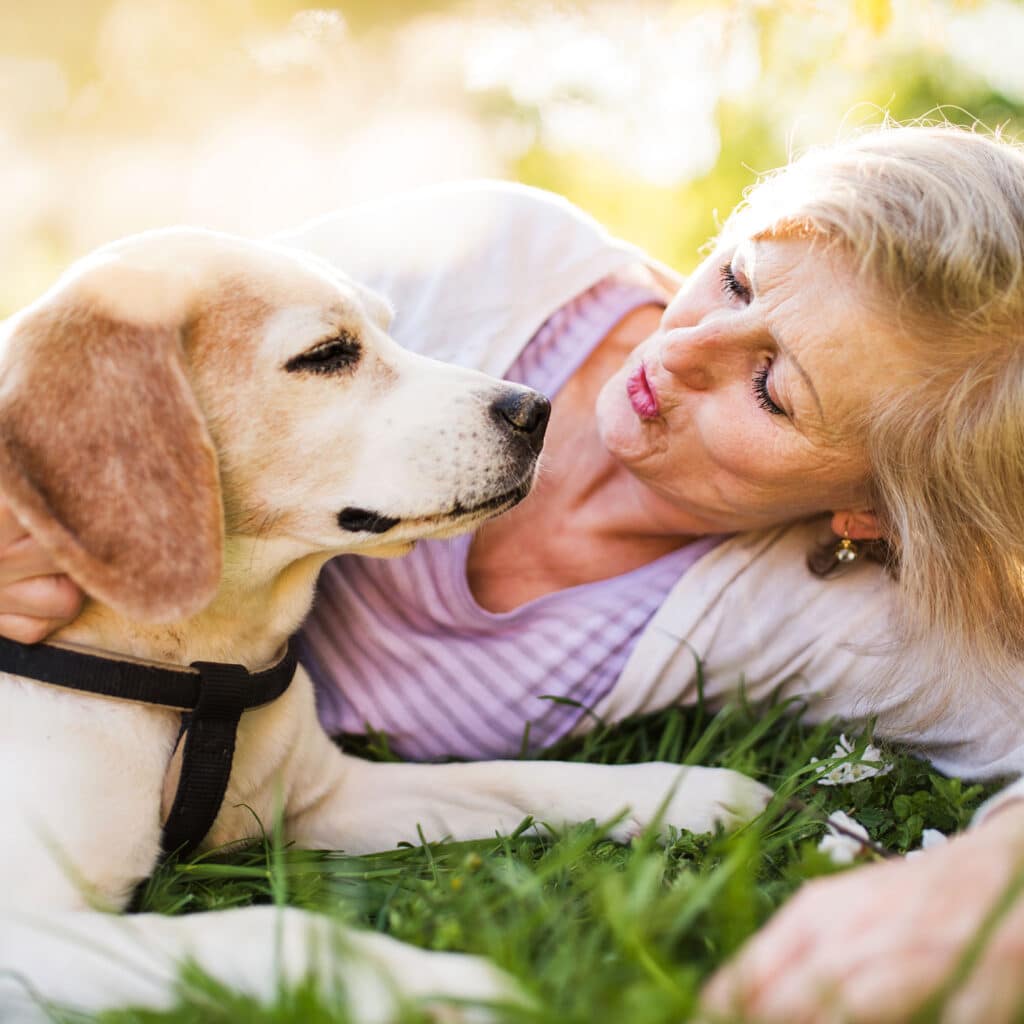 Ah, the dog days of summer! And no, we’re not just talking about the heat. Longer daylight hours and warm weather make it the ideal season for fun-filled adventures with your furry friends. On days that are too nice to stay indoors, why not have some fun in the sun with your dog (or daring cat)?
Ah, the dog days of summer! And no, we’re not just talking about the heat. Longer daylight hours and warm weather make it the ideal season for fun-filled adventures with your furry friends. On days that are too nice to stay indoors, why not have some fun in the sun with your dog (or daring cat)? Did you drink any water today? Summer weather can be intense, with temperatures often soaring into the 90s and humidity making it feel even hotter. It’s easy to get dehydrated quickly, especially when you’re out enjoying the sunshine. If you want to increase your water intake, the Seniors Helping Seniors® team has your back with some delightful tips to help you stay hydrated all summer.
Did you drink any water today? Summer weather can be intense, with temperatures often soaring into the 90s and humidity making it feel even hotter. It’s easy to get dehydrated quickly, especially when you’re out enjoying the sunshine. If you want to increase your water intake, the Seniors Helping Seniors® team has your back with some delightful tips to help you stay hydrated all summer. Every year, on the last Monday of May, citizens celebrate Memorial Day to honor the brave US service members who sacrificed their lives for our country. It’s an impactful opportunity to remember and appreciate their selflessness and dedication.
Every year, on the last Monday of May, citizens celebrate Memorial Day to honor the brave US service members who sacrificed their lives for our country. It’s an impactful opportunity to remember and appreciate their selflessness and dedication. This May, join the Seniors Helping Seniors® team in recognizing Older Americans Month. To celebrate, we want to share expert advice and tips to help seniors age healthily and happily at home. This article suggests simple lifestyle adjustments that make home life better for seniors.
This May, join the Seniors Helping Seniors® team in recognizing Older Americans Month. To celebrate, we want to share expert advice and tips to help seniors age healthily and happily at home. This article suggests simple lifestyle adjustments that make home life better for seniors.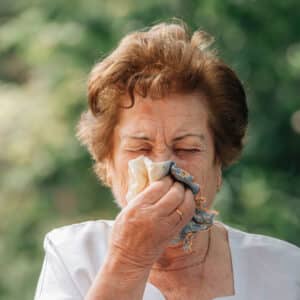 April showers bring May flowers… and a dusting of pollen. While we welcome the arrival of warmer days and sunny skies, many Seniors Helping Seniors® clients face symptoms from springtime allergies. As we age, weakened immune systems or pre-existing health conditions can make older adults more vulnerable to allergies. With the allergy season peaking in April, symptoms like congestion, itchiness, and sneezing often come in full swing. If you’ve been struck by spring fever this year, the Seniors Helping Seniors® team wants to help. In this blog, we’ll review seven senior-focused tips for navigating the allergy season. Keep reading to discover our best advice for enjoying the beauty of spring while minimizing the annoying symptoms of allergies.
April showers bring May flowers… and a dusting of pollen. While we welcome the arrival of warmer days and sunny skies, many Seniors Helping Seniors® clients face symptoms from springtime allergies. As we age, weakened immune systems or pre-existing health conditions can make older adults more vulnerable to allergies. With the allergy season peaking in April, symptoms like congestion, itchiness, and sneezing often come in full swing. If you’ve been struck by spring fever this year, the Seniors Helping Seniors® team wants to help. In this blog, we’ll review seven senior-focused tips for navigating the allergy season. Keep reading to discover our best advice for enjoying the beauty of spring while minimizing the annoying symptoms of allergies. Celebrated each April, National Occupational Therapy Month recognizes the valuable contributions of this specialized form of healthcare. While Seniors Helping Seniors® in-home care services provide daily support for those we serve, occupational therapy is another method that helps seniors maintain their independence. In this Seniors Helping Seniors® blog, we’ll review the field of occupational therapy and explore the ways it can enhance the lives of seniors. Keep reading to learn more about National Occupational Therapy Month and the holistic advantages your Seniors Helping Seniors® caregiver can help provide and practice.
Celebrated each April, National Occupational Therapy Month recognizes the valuable contributions of this specialized form of healthcare. While Seniors Helping Seniors® in-home care services provide daily support for those we serve, occupational therapy is another method that helps seniors maintain their independence. In this Seniors Helping Seniors® blog, we’ll review the field of occupational therapy and explore the ways it can enhance the lives of seniors. Keep reading to learn more about National Occupational Therapy Month and the holistic advantages your Seniors Helping Seniors® caregiver can help provide and practice. Seniors, it’s time to make every dollar count and thrive financially with our Seniors Helping Seniors® exclusive budgeting tips. In today’s rapidly evolving economic landscape, seniors in the southern region must manage their finances wisely, to ensure a comfortable and stable future. In this blog, we will explore various practical strategies and resources. From taking advantage of senior discounts offered at grocery stores to utilizing budgeting apps and automating savings, we’ll cover all the essentials. Whether you’re looking to extend your retirement savings, protect your investments, or explore sustainable energy solutions such as solar panels, our guide is here to help. Join us as we embark on a journey to empower seniors with the knowledge and tools necessary to achieve financial well-being and peace of mind. Keep reading and let’s dive in!
Seniors, it’s time to make every dollar count and thrive financially with our Seniors Helping Seniors® exclusive budgeting tips. In today’s rapidly evolving economic landscape, seniors in the southern region must manage their finances wisely, to ensure a comfortable and stable future. In this blog, we will explore various practical strategies and resources. From taking advantage of senior discounts offered at grocery stores to utilizing budgeting apps and automating savings, we’ll cover all the essentials. Whether you’re looking to extend your retirement savings, protect your investments, or explore sustainable energy solutions such as solar panels, our guide is here to help. Join us as we embark on a journey to empower seniors with the knowledge and tools necessary to achieve financial well-being and peace of mind. Keep reading and let’s dive in! How did you sleep last night? The Seniors Helping Seniors® family is celebrating National Sleep Awareness Week from March 10th to March 16th. It’s an excellent opportunity to reflect on your habits and consider any adjustments you can make to enhance the quality of your sleep.
How did you sleep last night? The Seniors Helping Seniors® family is celebrating National Sleep Awareness Week from March 10th to March 16th. It’s an excellent opportunity to reflect on your habits and consider any adjustments you can make to enhance the quality of your sleep. Even though Valentine’s Day has passed, there are no rules on when you can show gratitude toward those who matter most. Throughout the year, Seniors Helping Seniors® in-home care services demonstrate that Love is in our Care®. We do this with heartfelt acts of service and compassion. Our caregivers work tirelessly to provide exceptional assistance to seniors nationwide, and we cannot thank them enough for their hard work!
Even though Valentine’s Day has passed, there are no rules on when you can show gratitude toward those who matter most. Throughout the year, Seniors Helping Seniors® in-home care services demonstrate that Love is in our Care®. We do this with heartfelt acts of service and compassion. Our caregivers work tirelessly to provide exceptional assistance to seniors nationwide, and we cannot thank them enough for their hard work! While physical fitness is crucial for seniors’ health, nurturing one’s mind is equally as important. Brain exercises enhance cognitive abilities, memory, and focus, similar to how diverse workouts target specific muscle groups. At Seniors Helping Seniors® in-home care services, we understand the unique needs of our clients in the Northeast. That’s why we’ve gathered eight enjoyable memory games designed to improve mental skills and keep the mind agile. Read on to discover these delightful, brain-boosting activities and let’s play!
While physical fitness is crucial for seniors’ health, nurturing one’s mind is equally as important. Brain exercises enhance cognitive abilities, memory, and focus, similar to how diverse workouts target specific muscle groups. At Seniors Helping Seniors® in-home care services, we understand the unique needs of our clients in the Northeast. That’s why we’ve gathered eight enjoyable memory games designed to improve mental skills and keep the mind agile. Read on to discover these delightful, brain-boosting activities and let’s play!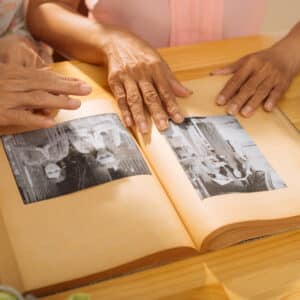 Every passing year leaves behind its own set of special memories. The Seniors Helping Seniors® family loves helping those we serve to reflect on the past and document its most meaningful parts. The result is a tangible keepsake showcasing our clients’ treasured moments and personal growth.
Every passing year leaves behind its own set of special memories. The Seniors Helping Seniors® family loves helping those we serve to reflect on the past and document its most meaningful parts. The result is a tangible keepsake showcasing our clients’ treasured moments and personal growth. The holiday season calls for joy, celebration, and connection! Technology can help increase accessibility during this festive period; however, many seniors feel overwhelmed navigating the digital space. To help our clients stay active and engaged during the holiday season, the Seniors Helping Seniors® team has put together a handy guide with easy-to-follow tech tips designed to elevate every experience during this special time of year.
The holiday season calls for joy, celebration, and connection! Technology can help increase accessibility during this festive period; however, many seniors feel overwhelmed navigating the digital space. To help our clients stay active and engaged during the holiday season, the Seniors Helping Seniors® team has put together a handy guide with easy-to-follow tech tips designed to elevate every experience during this special time of year. Autumn represents change and reflection, making it the perfect backdrop for seniors to embrace the therapeutic benefits of music. During this transformative season, sentimental and nostalgic feelings often arise. Creating an uplifting fall song playlist can be a cathartic way to express emotions. In this blog post, we explore music’s profound impact on seniors’ emotional, physical, and social well-being. Continue reading for a few Seniors Helping Seniors® recommendations on curating an inspiring autumn soundtrack.
Autumn represents change and reflection, making it the perfect backdrop for seniors to embrace the therapeutic benefits of music. During this transformative season, sentimental and nostalgic feelings often arise. Creating an uplifting fall song playlist can be a cathartic way to express emotions. In this blog post, we explore music’s profound impact on seniors’ emotional, physical, and social well-being. Continue reading for a few Seniors Helping Seniors® recommendations on curating an inspiring autumn soundtrack. The Seniors Helping Seniors® family takes pride in facilitating meaningful, lasting connections between caregivers, clients, and families. We base our mission around the importance of forming a positive relationship between those giving and receiving in-home senior care.
The Seniors Helping Seniors® family takes pride in facilitating meaningful, lasting connections between caregivers, clients, and families. We base our mission around the importance of forming a positive relationship between those giving and receiving in-home senior care. Crafting beautiful and festive pumpkins doesn’t have to involve sharp tools and a big mess to clean up. For seniors in the Heartland looking for an orderly and safer way to decorate their fall gourds, the Seniors Helping Seniors® family has gathered a range of creative options that promise all the charm of pumpkin decoration without the fuss.
Crafting beautiful and festive pumpkins doesn’t have to involve sharp tools and a big mess to clean up. For seniors in the Heartland looking for an orderly and safer way to decorate their fall gourds, the Seniors Helping Seniors® family has gathered a range of creative options that promise all the charm of pumpkin decoration without the fuss.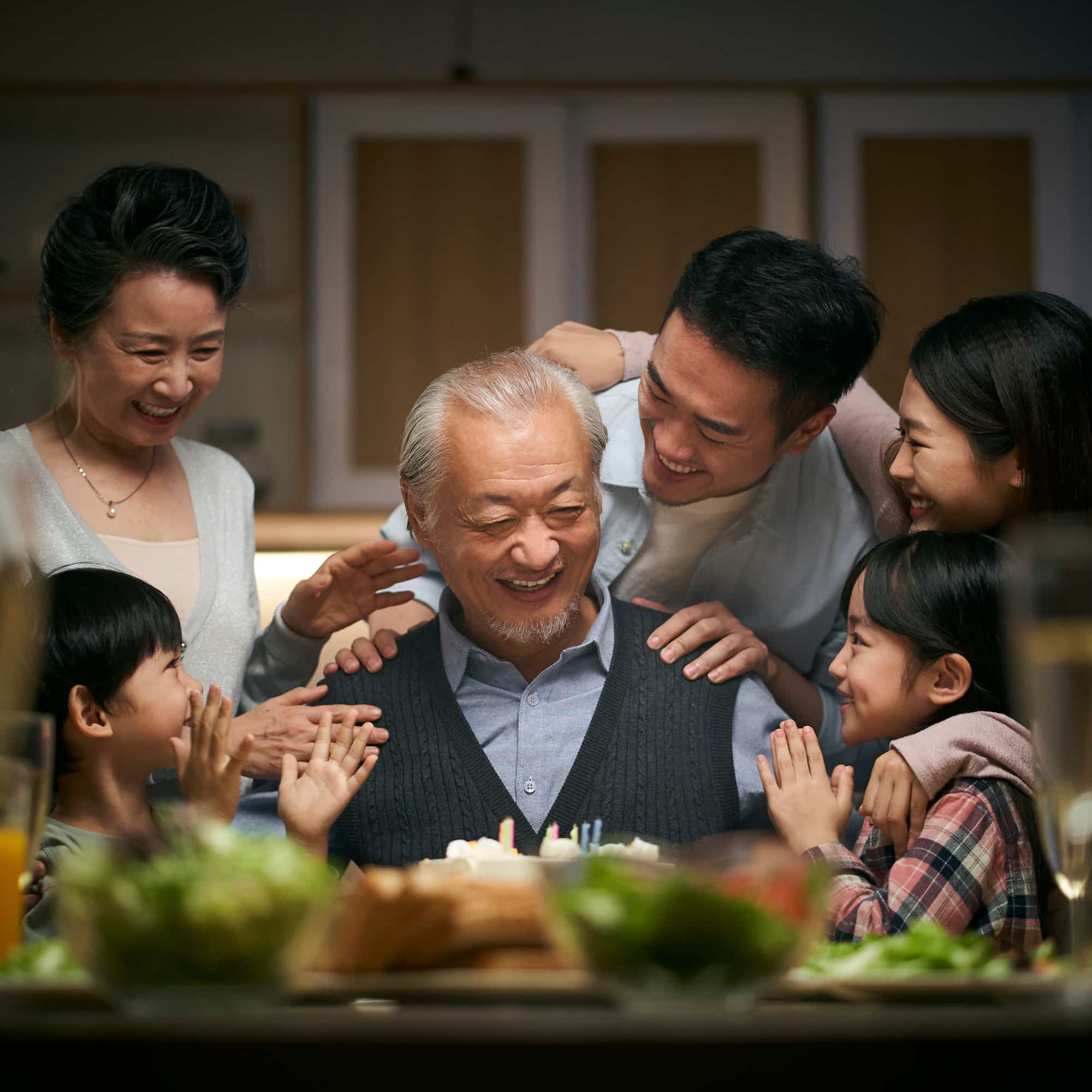 Growing older can be an amazing experience, and having your aging parents involved in your life and your children’s can be an enriching and wonderful thing for all concerned. However, as our parents move through their golden years, some additional challenges may emerge around
Growing older can be an amazing experience, and having your aging parents involved in your life and your children’s can be an enriching and wonderful thing for all concerned. However, as our parents move through their golden years, some additional challenges may emerge around 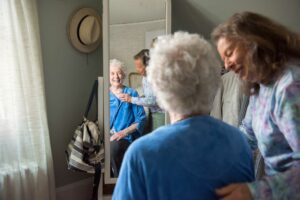 Healthy Aging Month, celebrated every September, brings awareness to the physical and mental changes seniors experience as they age. This month-long observance also reminds seniors to care for physical and mental health throughout the golden years. Seniors Helping Seniors® in-home care services enable older adults to lead a vibrant and fulfilling life. A kind hand and a positive perspective will help you or your senior loved one remain connected, curious, and content as you navigate the later years.
Healthy Aging Month, celebrated every September, brings awareness to the physical and mental changes seniors experience as they age. This month-long observance also reminds seniors to care for physical and mental health throughout the golden years. Seniors Helping Seniors® in-home care services enable older adults to lead a vibrant and fulfilling life. A kind hand and a positive perspective will help you or your senior loved one remain connected, curious, and content as you navigate the later years. Everyone views aging differently. To some, the idea of getting older is scary. Others embrace it with a youthful ferocity! At the end of the day, your mindset is more important than you think. It plays a large part in the quality of life experienced throughout your Golden Years.
Seniors Helping Seniors® in-home care services is committed to inspiring others to age gracefully and independently. One of the ways we encourage our care recipients to make the most of their senior years is by promoting “positive aging” techniques.
What Is Positive Aging?
Positive aging is all about mindset. It refers to the idea that if you maintain an optimistic outlook in your senior years — coupled with healthy habits, social engagement, and mental stimulation — you’ll feel good about yourself, remain physically active, and continue to engage fully in all aspects of life!
Incorporating positive aging techniques into your daily routine might sound difficult, but it’s easier than you think. Of course, our Seniors Helping Seniors® caregivers will stand by your side, ready to help you create and practice a program that will do your mind and body good!
Now that you know why positive aging is important, let’s discuss five simple ways Seniors Helping Seniors® care receivers can work the power of positivity into everyday life!
1 – Embrace Your Age!
Age is just a number, after all. Maintaining a youthful outlook and adapting to your changing abilities can help you accept that growing older is a normal part of life – one that every person (including your Seniors Helping Seniors® caregiver) is attempting to navigate.
The first step in discovering the power of positive aging is to accept the aging process by working with it and not against it. This makes it easier to cope with the challenges this stage of life presents, and instead, start looking forward to the possibilities!
2 – Make Fitness A Priority
Just thirty minutes of daily exercise can revolutionize your health. It can help you look and feel younger, complete tasks more easily, and prevent accidents and falls – all of which are essential for maintaining a positive outlook. Try the following Seniors Helping Seniors® suggestions to jumpstart your fitness routine:
Go for a walk
Walking is an excellent way to get the blood pumping while improving heart health, boosting mental clarity, and lowering blood pressure. Commit to a daily walk with a friend, family member, or your Seniors Helping Seniors® companion!
Explore senior fitness classes
There are plenty of exercise options for active seniors! Look into what classes your local senior center, gym, or fitness studio offers. Activities like water aerobics, chair yoga, and body weight workouts are popular among seniors and provide low impact workouts that will still make you feel the burn!
Don’t get discouraged if it’s tough to keep up at first. Your workouts will become easier as you build strength. Be consistent and you’ll soon look forward to your daily exercise regimen!
3 – Stay Connected
Building and maintaining close relationships is also essential to a positive aging plan. Doing so can combat loneliness, improve self-esteem, and foster a sense of belonging. Not sure where to begin? Try one of the following to make new friends or reconnect with some old pals:
Everyone views aging differently. To some, the idea of getting older is scary. Others embrace it with a youthful ferocity! At the end of the day, your mindset is more important than you think. It plays a large part in the quality of life experienced throughout your Golden Years.
Seniors Helping Seniors® in-home care services is committed to inspiring others to age gracefully and independently. One of the ways we encourage our care recipients to make the most of their senior years is by promoting “positive aging” techniques.
What Is Positive Aging?
Positive aging is all about mindset. It refers to the idea that if you maintain an optimistic outlook in your senior years — coupled with healthy habits, social engagement, and mental stimulation — you’ll feel good about yourself, remain physically active, and continue to engage fully in all aspects of life!
Incorporating positive aging techniques into your daily routine might sound difficult, but it’s easier than you think. Of course, our Seniors Helping Seniors® caregivers will stand by your side, ready to help you create and practice a program that will do your mind and body good!
Now that you know why positive aging is important, let’s discuss five simple ways Seniors Helping Seniors® care receivers can work the power of positivity into everyday life!
1 – Embrace Your Age!
Age is just a number, after all. Maintaining a youthful outlook and adapting to your changing abilities can help you accept that growing older is a normal part of life – one that every person (including your Seniors Helping Seniors® caregiver) is attempting to navigate.
The first step in discovering the power of positive aging is to accept the aging process by working with it and not against it. This makes it easier to cope with the challenges this stage of life presents, and instead, start looking forward to the possibilities!
2 – Make Fitness A Priority
Just thirty minutes of daily exercise can revolutionize your health. It can help you look and feel younger, complete tasks more easily, and prevent accidents and falls – all of which are essential for maintaining a positive outlook. Try the following Seniors Helping Seniors® suggestions to jumpstart your fitness routine:
Go for a walk
Walking is an excellent way to get the blood pumping while improving heart health, boosting mental clarity, and lowering blood pressure. Commit to a daily walk with a friend, family member, or your Seniors Helping Seniors® companion!
Explore senior fitness classes
There are plenty of exercise options for active seniors! Look into what classes your local senior center, gym, or fitness studio offers. Activities like water aerobics, chair yoga, and body weight workouts are popular among seniors and provide low impact workouts that will still make you feel the burn!
Don’t get discouraged if it’s tough to keep up at first. Your workouts will become easier as you build strength. Be consistent and you’ll soon look forward to your daily exercise regimen!
3 – Stay Connected
Building and maintaining close relationships is also essential to a positive aging plan. Doing so can combat loneliness, improve self-esteem, and foster a sense of belonging. Not sure where to begin? Try one of the following to make new friends or reconnect with some old pals:
 The Seniors Helping Seniors® family loves seeing our care receivers enjoy the best parts of each season. With summer fast approaching in the Northeast, it will soon be time to break out the shorts, light the citronella candle, and dust off the patio table for the season’s first outdoor feast!
The Seniors Helping Seniors® family loves seeing our care receivers enjoy the best parts of each season. With summer fast approaching in the Northeast, it will soon be time to break out the shorts, light the citronella candle, and dust off the patio table for the season’s first outdoor feast!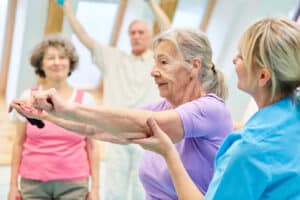 April is National Occupational Therapy Month and Seniors Helping Seniors® in-home care services is taking a moment to champion this life-changing treatment. Occupational therapy (OT) helps people of all ages maintain, or regain, the skills necessary to perform everyday activities.
April is National Occupational Therapy Month and Seniors Helping Seniors® in-home care services is taking a moment to champion this life-changing treatment. Occupational therapy (OT) helps people of all ages maintain, or regain, the skills necessary to perform everyday activities.

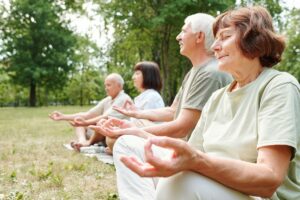
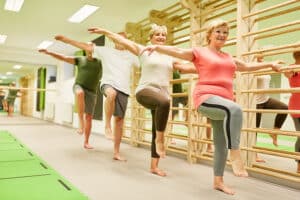

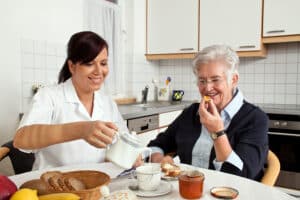

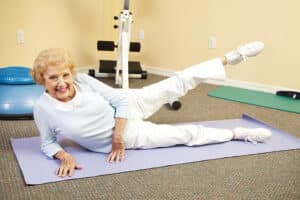
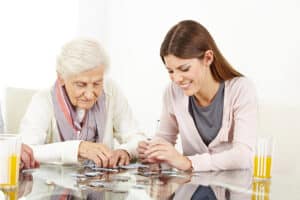
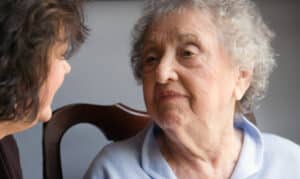
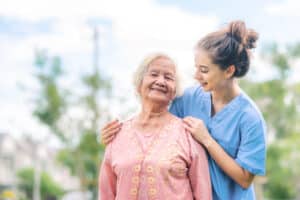
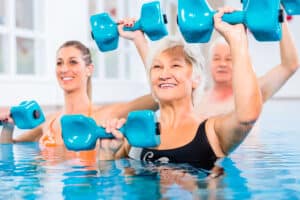

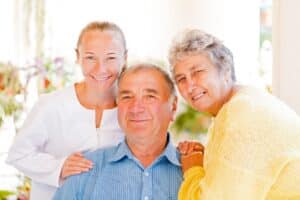



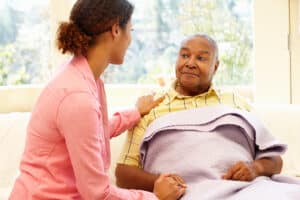
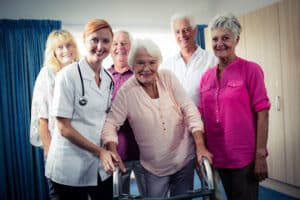


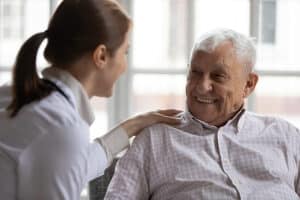
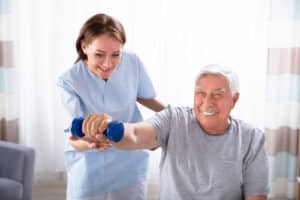

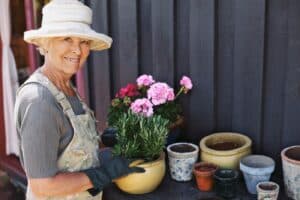


 Another way for your elderly loved one to improve their flexibility is through the standard shoulder stretch. If your elderly loved one has tight shoulders from sleeping in an odd position or for any other reason, this stretch can help. To do this stretch, your elderly loved one will need to do the following:
Another way for your elderly loved one to improve their flexibility is through the standard shoulder stretch. If your elderly loved one has tight shoulders from sleeping in an odd position or for any other reason, this stretch can help. To do this stretch, your elderly loved one will need to do the following:
 Systolic blood pressure is a measurement of the pressure within arteries during a heartbeat. Diastolic is a measurement of the pressure between heartbeats. The higher that pressure, the more risk of health issues related to the excess strain on the arteries and blood vessels.
Systolic blood pressure is a measurement of the pressure within arteries during a heartbeat. Diastolic is a measurement of the pressure between heartbeats. The higher that pressure, the more risk of health issues related to the excess strain on the arteries and blood vessels.

 On February 19 we celebrated National Caregivers Day! This special day was founded in 2015 by the Providers Association for Home Health & Hospice Agencies (PAHHHA) to honor the men and women who commit their lives to care for someone else’s needs. National Caregivers Day is the perfect time to acknowledge the dedicated and compassionate people who work as caregivers. At Seniors Helping Senior Raleigh we are grateful for our incredible caregivers who have continued to provide high-quality care for our clients over these challenging months. Our amazing team enjoyed lunch from Chick-Fil-A and Sheetz gift cards as a small token of our gratitude.
On February 19 we celebrated National Caregivers Day! This special day was founded in 2015 by the Providers Association for Home Health & Hospice Agencies (PAHHHA) to honor the men and women who commit their lives to care for someone else’s needs. National Caregivers Day is the perfect time to acknowledge the dedicated and compassionate people who work as caregivers. At Seniors Helping Senior Raleigh we are grateful for our incredible caregivers who have continued to provide high-quality care for our clients over these challenging months. Our amazing team enjoyed lunch from Chick-Fil-A and Sheetz gift cards as a small token of our gratitude. If your parent still does any work in his shop, like car repairs or maybe working on a hobby like wood crafting, it’s important he dons the correct protective eye wear to make sure his eyes aren’t damaged by flying materials or extreme heat. If he participates in sports activities like racquetball or tennis, protective goggles could save his eyes from a direct hit.
If your parent still does any work in his shop, like car repairs or maybe working on a hobby like wood crafting, it’s important he dons the correct protective eye wear to make sure his eyes aren’t damaged by flying materials or extreme heat. If he participates in sports activities like racquetball or tennis, protective goggles could save his eyes from a direct hit. Scammers look for people who are lonely and don’t have a lot of people in their lives to help them make decisions. Thankfully, as a caregiver for your parent, you’ve already provided her with one resource against this tactic. Helping your parent stay connected with caring individuals like her senior care provider or local friends, will reduce the chance that she’ll reach out to a stranger for connection and then possible abuse.
Scammers look for people who are lonely and don’t have a lot of people in their lives to help them make decisions. Thankfully, as a caregiver for your parent, you’ve already provided her with one resource against this tactic. Helping your parent stay connected with caring individuals like her senior care provider or local friends, will reduce the chance that she’ll reach out to a stranger for connection and then possible abuse. Before you make any plans, look at your life. How many hours do you work each week? How long of a commute do you have? If you work eight hours a day and commute an hour every day, you’re already using up nine hours.
Before you make any plans, look at your life. How many hours do you work each week? How long of a commute do you have? If you work eight hours a day and commute an hour every day, you’re already using up nine hours. Board Games. Most board games require a group of people (or at least two) so if your parent has someone to play a board game with her such as yourself or her home care provider, why not break out the game of Monopoly or Connect Four to keep the brain sharp and engaged in the world around her?
Board Games. Most board games require a group of people (or at least two) so if your parent has someone to play a board game with her such as yourself or her home care provider, why not break out the game of Monopoly or Connect Four to keep the brain sharp and engaged in the world around her?
 Keeping eye contact can make your elderly loved one see that you care about them and love them. It is a polite gesture that allows your elderly loved one to feel like they have control over the situation, as well. It will also let them know you are trying to understand their feelings and what they are saying.
Keeping eye contact can make your elderly loved one see that you care about them and love them. It is a polite gesture that allows your elderly loved one to feel like they have control over the situation, as well. It will also let them know you are trying to understand their feelings and what they are saying. Most non-profits rely on the financial gifts of their supporters to fund their mission. From just a couple dollars to more if she feels led, your parent can support this endeavor to provide equal cancer care to everyone everywhere.
Most non-profits rely on the financial gifts of their supporters to fund their mission. From just a couple dollars to more if she feels led, your parent can support this endeavor to provide equal cancer care to everyone everywhere. Your elderly loved one should also pay attention to their cholesterol. People who have high cholesterol often have plaque buildup. This can clog the arteries and cause heart disease and/or strokes. You and caregivers can help your elderly loved one to manage and control their cholesterol. By eating healthy, exercising, and possibly taking medications, your elderly loved one can get their cholesterol back to healthier levels.
Your elderly loved one should also pay attention to their cholesterol. People who have high cholesterol often have plaque buildup. This can clog the arteries and cause heart disease and/or strokes. You and caregivers can help your elderly loved one to manage and control their cholesterol. By eating healthy, exercising, and possibly taking medications, your elderly loved one can get their cholesterol back to healthier levels. There are two main types of glaucoma: open-angle glaucoma, and angle-closure glaucoma. Open-angle glaucoma is the most common type of the disease. Pressure grows in the eye slowly over time, damaging the optic nerve. It can happen so slowly that your parent may lose vision before she’s even aware of a problem. The other type of glaucoma, angle-closure glaucoma, is a lot more rare and often happens suddenly. The fluid in the eye is not able to circulate.
There are two main types of glaucoma: open-angle glaucoma, and angle-closure glaucoma. Open-angle glaucoma is the most common type of the disease. Pressure grows in the eye slowly over time, damaging the optic nerve. It can happen so slowly that your parent may lose vision before she’s even aware of a problem. The other type of glaucoma, angle-closure glaucoma, is a lot more rare and often happens suddenly. The fluid in the eye is not able to circulate. While your parent (or her elder care provider if she’s helping with this task) won’t want to use toothpaste to clean her dentures (it is abrasive and can cause tiny scratches on the dentures that food or bacteria may build up), dentures still require daily brushing and rinsing. Have your parent purchase a brush specifically designed to brush dentures with its soft bristles. She should brush her dentures daily with the brush and water, while also rinsing her dentures after each meal.
While your parent (or her elder care provider if she’s helping with this task) won’t want to use toothpaste to clean her dentures (it is abrasive and can cause tiny scratches on the dentures that food or bacteria may build up), dentures still require daily brushing and rinsing. Have your parent purchase a brush specifically designed to brush dentures with its soft bristles. She should brush her dentures daily with the brush and water, while also rinsing her dentures after each meal. Broccoli is another one of the foods that can fight off cancer. This food contains a lot of sulforaphane in it. This helps the body to stay protected from chemicals that cause cancer. Some of the various types of cancer that broccoli can fight off include bladder, stomach, skin, prostate, lung, breast, and liver cancer. If you would like to help your elderly loved one fight off all these cancers, you and the home care providers should add more broccoli to your loved one’s meals.
Broccoli is another one of the foods that can fight off cancer. This food contains a lot of sulforaphane in it. This helps the body to stay protected from chemicals that cause cancer. Some of the various types of cancer that broccoli can fight off include bladder, stomach, skin, prostate, lung, breast, and liver cancer. If you would like to help your elderly loved one fight off all these cancers, you and the home care providers should add more broccoli to your loved one’s meals. She may get messages from people from time to time. They’ll often go into a spam or hidden folder at first. She needs to learn how to look at them without adding the person as a friend. She needs to learn that scammers will often try to befriend people through social media in hopes of getting them to share bank information or send money.
She may get messages from people from time to time. They’ll often go into a spam or hidden folder at first. She needs to learn how to look at them without adding the person as a friend. She needs to learn that scammers will often try to befriend people through social media in hopes of getting them to share bank information or send money. If your elderly loved one wants to take great care of their vision, they should also be doing eye exercises. They can move their eyes to one area and then slowly put them back to the original spot. They can rub their hands on top of each other and then put them on their eyes for a few seconds. This can be do multiple times. Rolling the eyes clockwise and counterclockwise can help to exercise the eyes, as well.
If your elderly loved one wants to take great care of their vision, they should also be doing eye exercises. They can move their eyes to one area and then slowly put them back to the original spot. They can rub their hands on top of each other and then put them on their eyes for a few seconds. This can be do multiple times. Rolling the eyes clockwise and counterclockwise can help to exercise the eyes, as well.



 One of the things you might have been doing without realizing it is filling in the blanks for your elderly family member. Everybody does that now and again, but it’s a technique that can come with some pitfalls. You may not always correctly guess what she’s trying to say or where she’s trying to go with a specific conversation. There are times that she might even shut down out of frustration and then you might have missed something really important from her. This involves patience again and letting your senior guide the pace.
One of the things you might have been doing without realizing it is filling in the blanks for your elderly family member. Everybody does that now and again, but it’s a technique that can come with some pitfalls. You may not always correctly guess what she’s trying to say or where she’s trying to go with a specific conversation. There are times that she might even shut down out of frustration and then you might have missed something really important from her. This involves patience again and letting your senior guide the pace. If you were under the impression that caregiver services were too costly for your elderly loved one, that may not be the case. The truth is that these services are usually quite affordable. When you think about it, your elderly loved one might only need home care services for a few hours every week. There is no reason to put them in a place where they will be charged a lot, when they don’t need that much extra help and care.
If you were under the impression that caregiver services were too costly for your elderly loved one, that may not be the case. The truth is that these services are usually quite affordable. When you think about it, your elderly loved one might only need home care services for a few hours every week. There is no reason to put them in a place where they will be charged a lot, when they don’t need that much extra help and care. In some cases, a senior’s immune system is able to fight off the infection-causing bacteria on its own, but in other cases it cannot. Drinking extra fluids, especially cranberry juice, when mild, potential signs of UTI first rear their head may be enough to turn it around. However, if they persist more than a day or so, or are bothersome, talk to the doctor right away. They may want to arrange testing and treatment to prevent complications.
In some cases, a senior’s immune system is able to fight off the infection-causing bacteria on its own, but in other cases it cannot. Drinking extra fluids, especially cranberry juice, when mild, potential signs of UTI first rear their head may be enough to turn it around. However, if they persist more than a day or so, or are bothersome, talk to the doctor right away. They may want to arrange testing and treatment to prevent complications.
 You will also want to encourage your elderly loved one to keep being independent when they can. It is a good thing for your elderly loved one to do tasks they are still capable of doing. For instance, if your elderly loved one can still do the dishes, let them. Yes, they might need someone to supervise to ensure they don’t turn the water up too hot. However, if they can do the task itself, encourage them to keep doing it. The longer your elderly loved one can be independent, the better their life can be.
You will also want to encourage your elderly loved one to keep being independent when they can. It is a good thing for your elderly loved one to do tasks they are still capable of doing. For instance, if your elderly loved one can still do the dishes, let them. Yes, they might need someone to supervise to ensure they don’t turn the water up too hot. However, if they can do the task itself, encourage them to keep doing it. The longer your elderly loved one can be independent, the better their life can be. Seniors Helping Seniors of North and East Raleigh was proud to participate in the Rolesville Chamber of Commerce’s Business Saturday on October 24th. Over 60 local businesses participated in this daylong event designed to provide attention and support to our local businesses during these trying times for our neighborhood economy. Prizes, giveaways and raffles were held at local Rolesville locations and a good time was had by all on a beautiful autumn afternoon.
Seniors Helping Seniors of North and East Raleigh was proud to participate in the Rolesville Chamber of Commerce’s Business Saturday on October 24th. Over 60 local businesses participated in this daylong event designed to provide attention and support to our local businesses during these trying times for our neighborhood economy. Prizes, giveaways and raffles were held at local Rolesville locations and a good time was had by all on a beautiful autumn afternoon. You don’t have to have a lot of skill to turn out impressive paintings. Abstract paintings are just as beautiful as an impressionist painting. Get a starter kit that includes some acrylic or oil paints, brushes, a palette, and a few canvases for you and your dad to share.
You don’t have to have a lot of skill to turn out impressive paintings. Abstract paintings are just as beautiful as an impressionist painting. Get a starter kit that includes some acrylic or oil paints, brushes, a palette, and a few canvases for you and your dad to share. Your senior’s doctor can help you to look even deeper. There are plenty of medical causes for cognitive changes, ranging from medication side effects to side effects from depression and even the early stages of dementia. It’s vital to determine as much as you can about what your senior is facing so that you can help her to cope. There may be simpler explanations than you and your elderly family member are worried you’ll hear about.
Your senior’s doctor can help you to look even deeper. There are plenty of medical causes for cognitive changes, ranging from medication side effects to side effects from depression and even the early stages of dementia. It’s vital to determine as much as you can about what your senior is facing so that you can help her to cope. There may be simpler explanations than you and your elderly family member are worried you’ll hear about.
 One of the most common involves assuming all home care is the same. It’s not. There are different types of home care, different levels, and different types of affordability.
One of the most common involves assuming all home care is the same. It’s not. There are different types of home care, different levels, and different types of affordability. Those small decisions that can bog down your day, like whether your senior has oatmeal or eggs for breakfast, could be ones that you really should leave to her. The choices that you give her don’t have to be the biggest or most complicated one on your plate at all. What you’re doing when you offer more options is opening up possibilities for her.
Those small decisions that can bog down your day, like whether your senior has oatmeal or eggs for breakfast, could be ones that you really should leave to her. The choices that you give her don’t have to be the biggest or most complicated one on your plate at all. What you’re doing when you offer more options is opening up possibilities for her.




 Another routine task that gets more difficult as your senior ages can be everything to do with food and preparing food. It takes a lot of energy to determine what to eat, to shop for the ingredients, and to cook the food. From there, your senior is also looking at cleaning up and dealing with any leftovers. It’s a lot to manage on her own. But with the right help, your senior also has a friendly face there with her for meals.
Another routine task that gets more difficult as your senior ages can be everything to do with food and preparing food. It takes a lot of energy to determine what to eat, to shop for the ingredients, and to cook the food. From there, your senior is also looking at cleaning up and dealing with any leftovers. It’s a lot to manage on her own. But with the right help, your senior also has a friendly face there with her for meals. Some seniors find that their pain responds well to gentle massage. In one study, researchers found that people who had a 30-minute massage twice per week had less pain. As a result, they slept better at night.
Some seniors find that their pain responds well to gentle massage. In one study, researchers found that people who had a 30-minute massage twice per week had less pain. As a result, they slept better at night.

 Elderly care providers can ensure that seniors can continue to eat well even when they have difficulty cooking for themselves. An elderly care provider can prepare meals and snacks that use healthy ingredients. If the older adult enjoys cooking, they can cook with the elderly care provider, so they can still have a hand in making the food they eat.
Elderly care providers can ensure that seniors can continue to eat well even when they have difficulty cooking for themselves. An elderly care provider can prepare meals and snacks that use healthy ingredients. If the older adult enjoys cooking, they can cook with the elderly care provider, so they can still have a hand in making the food they eat.



 Yoga is a good exercise. If you don’t want to go to a studio for a class, go onto YouTube and follow along to a beginner’s Yoga video.
Yoga is a good exercise. If you don’t want to go to a studio for a class, go onto YouTube and follow along to a beginner’s Yoga video. Ask if Friends and Family Can Pitch In
Ask if Friends and Family Can Pitch In Your dad forgot to pay a bill. He’s never forgotten a bill before so you’re concerned. One missed payment isn’t a big deal. It happens. He may have been distracted by other things. If he’s missing payments every month, it may be a sign of dementia. If he has reminders in place and still misses payments, it’s a stronger sign.
Your dad forgot to pay a bill. He’s never forgotten a bill before so you’re concerned. One missed payment isn’t a big deal. It happens. He may have been distracted by other things. If he’s missing payments every month, it may be a sign of dementia. If he has reminders in place and still misses payments, it’s a stronger sign. If you’re feeling as if your senior’s safety is more at risk now than it has been, that’s a big reason for your role as her caregiver to start changing. You might need to change how you and she handle certain situations or it may be time to bring in more help. Elderly care providers can be a huge help in terms of keeping your senior much safer at home. They’re trained to recognize specific safety issues and either correct them or bring them to your attention to get them corrected.
If you’re feeling as if your senior’s safety is more at risk now than it has been, that’s a big reason for your role as her caregiver to start changing. You might need to change how you and she handle certain situations or it may be time to bring in more help. Elderly care providers can be a huge help in terms of keeping your senior much safer at home. They’re trained to recognize specific safety issues and either correct them or bring them to your attention to get them corrected. There are many elderly people who become aggressive. Sometimes, it might seem like there is no reason for them to be doing this. However, when looking into it, there is usually a reason. They might become aggressive because they can’t communicate well for some reason or another. They might also feel uncomfortable for various reasons. Some of these reasons might be because they either can’t do something on their own anymore or something in their environment is making them uncomfortable.
There are many elderly people who become aggressive. Sometimes, it might seem like there is no reason for them to be doing this. However, when looking into it, there is usually a reason. They might become aggressive because they can’t communicate well for some reason or another. They might also feel uncomfortable for various reasons. Some of these reasons might be because they either can’t do something on their own anymore or something in their environment is making them uncomfortable. Stress affects more than just your brain. It very much affects your body in a variety of ways. And if you’re already not sleeping well, your body doesn’t get a chance to repair itself overnight. Stress builds up in your muscles, which can cause you to feel pain in those areas as well as the joints around those muscles. When your body hurts, other things are that much more difficult, too.
Stress affects more than just your brain. It very much affects your body in a variety of ways. And if you’re already not sleeping well, your body doesn’t get a chance to repair itself overnight. Stress builds up in your muscles, which can cause you to feel pain in those areas as well as the joints around those muscles. When your body hurts, other things are that much more difficult, too.
 May reduce age-related memory loss.
May reduce age-related memory loss. A clerihew is always four lines. The structure is lines A and B rhyme and lines C and D rhyme. Lines don’t have to be the same length. They should vary in length. You could do one very short line, a long line, a line of medium length, and another long line. It’s up to you. It has to be biographical.
A clerihew is always four lines. The structure is lines A and B rhyme and lines C and D rhyme. Lines don’t have to be the same length. They should vary in length. You could do one very short line, a long line, a line of medium length, and another long line. It’s up to you. It has to be biographical. The first thing to think about when you and your elderly loved one go shopping for food is liquids. It is extremely important for elderly adults to consume plenty of liquids throughout the day. Water should be at the top of the list. Research shows that an elderly adult should also drink between 2 and 3 glasses of low-fat milk every day. In addition, to liquids, your elderly loved one should eat a variety of vegetables, protein, and whole grains, as well. As we all know, sometimes our elderly loved one might just want a frozen meal. If you choose to go this route, just make sure to read the nutritional label for information regarding calories, sodium, fats, and other nutrients that are included in the meal.
The first thing to think about when you and your elderly loved one go shopping for food is liquids. It is extremely important for elderly adults to consume plenty of liquids throughout the day. Water should be at the top of the list. Research shows that an elderly adult should also drink between 2 and 3 glasses of low-fat milk every day. In addition, to liquids, your elderly loved one should eat a variety of vegetables, protein, and whole grains, as well. As we all know, sometimes our elderly loved one might just want a frozen meal. If you choose to go this route, just make sure to read the nutritional label for information regarding calories, sodium, fats, and other nutrients that are included in the meal. During these times of self-imposed isolation, it is important for your loved ones to get some social interaction even if they can’t go out on their own. We like to let them know that they are not alone, and we are here for them when they need us.
During these times of self-imposed isolation, it is important for your loved ones to get some social interaction even if they can’t go out on their own. We like to let them know that they are not alone, and we are here for them when they need us. Much of that driving might involve getting some things done. Your senior may find that having someone to talk to while she’s handling necessary tasks is helpful, but the best part overall is that there’s someone there with her. If she has mobility problems or needs help safely navigating public spaces, it’s reassuring knowing that there’s someone there with her.
Much of that driving might involve getting some things done. Your senior may find that having someone to talk to while she’s handling necessary tasks is helpful, but the best part overall is that there’s someone there with her. If she has mobility problems or needs help safely navigating public spaces, it’s reassuring knowing that there’s someone there with her. When you do have your elderly family member opening up to you, make sure that you’re listening to what she’s saying. Trust that she’s giving you information that you can use to make the best decisions possible for her. If she does share with you specific needs or wants, like aging in place for as long as possible, help her to formulate a plan to achieve that goal.
When you do have your elderly family member opening up to you, make sure that you’re listening to what she’s saying. Trust that she’s giving you information that you can use to make the best decisions possible for her. If she does share with you specific needs or wants, like aging in place for as long as possible, help her to formulate a plan to achieve that goal. If your elderly loved one is concerned about getting skin cancer, one of the things they should be focused on is sun safety. There are many skin care products and sunscreen products that can help to protect your elderly loved one when they are out in the sun. Encouraging your elderly loved one to wear these products can help to reduce their risk of getting skin cancer. If your loved one’s elder care provider is going to take them outdoors, have them remind your loved one to put on sunscreen. While this doesn’t completely eliminate the risk of getting skin cancer, it does reduce the risk drastically.
If your elderly loved one is concerned about getting skin cancer, one of the things they should be focused on is sun safety. There are many skin care products and sunscreen products that can help to protect your elderly loved one when they are out in the sun. Encouraging your elderly loved one to wear these products can help to reduce their risk of getting skin cancer. If your loved one’s elder care provider is going to take them outdoors, have them remind your loved one to put on sunscreen. While this doesn’t completely eliminate the risk of getting skin cancer, it does reduce the risk drastically. There are many symptoms of eye floaters that you may need to know about. Some of these include the following:
There are many symptoms of eye floaters that you may need to know about. Some of these include the following: It is hard to believe that May is almost gone, and summer is here. With the COVID-19 pandemic and our lives turned topsy turvy time has gotten away from me. But I would be remiss if I let the month pass without recognizing some unsung heroes working every day to help keep our senior population stay safe. May is National Aging Life Care month. You may not be entirely aware of what they do but they can be a huge help to families and seniors. The Aging Life Care Professional is a health and human services specialist who is a guide, advocate, and resource for families caring for an older relative or disabled adult. The Aging Life Care Professional sits down with families as they face difficult life decisions and help them determine what options they have. Their guidance leads families to the actions and decisions that ensure quality care and an optimal life for those they love, thus reducing worry, stress, and time off work for family caregivers. They have extensive knowledge about the costs, quality, and availability of resources in their communities. I can give a real-life example from one of our local experts… One of my families was overwhelmed with the process of addressing the sudden cognitive changes he was seeing in his father. I referred him to a local aging life care professional who helped him navigate the doctor visits, financial concerns, and the various living options and ultimately helped him find the best solution for his father’s safety and wellbeing.
It is hard to believe that May is almost gone, and summer is here. With the COVID-19 pandemic and our lives turned topsy turvy time has gotten away from me. But I would be remiss if I let the month pass without recognizing some unsung heroes working every day to help keep our senior population stay safe. May is National Aging Life Care month. You may not be entirely aware of what they do but they can be a huge help to families and seniors. The Aging Life Care Professional is a health and human services specialist who is a guide, advocate, and resource for families caring for an older relative or disabled adult. The Aging Life Care Professional sits down with families as they face difficult life decisions and help them determine what options they have. Their guidance leads families to the actions and decisions that ensure quality care and an optimal life for those they love, thus reducing worry, stress, and time off work for family caregivers. They have extensive knowledge about the costs, quality, and availability of resources in their communities. I can give a real-life example from one of our local experts… One of my families was overwhelmed with the process of addressing the sudden cognitive changes he was seeing in his father. I referred him to a local aging life care professional who helped him navigate the doctor visits, financial concerns, and the various living options and ultimately helped him find the best solution for his father’s safety and wellbeing. These are just some of the causes of stress. No matter what has caused your elderly loved one’s stress to increase, there are ways to manage it.
These are just some of the causes of stress. No matter what has caused your elderly loved one’s stress to increase, there are ways to manage it. During the second stage of this disease, it is likely that your elderly loved one will start experiencing some memory loss. However, this is generally attributed to age-related issues. Your elderly loved one might lose their keys or forget to use a word in a sentence. Many people in the family or even home care providers may push this off as normal forgetfulness. It could be the start of the progression of this disease.
During the second stage of this disease, it is likely that your elderly loved one will start experiencing some memory loss. However, this is generally attributed to age-related issues. Your elderly loved one might lose their keys or forget to use a word in a sentence. Many people in the family or even home care providers may push this off as normal forgetfulness. It could be the start of the progression of this disease.

 No matter what your parents have heard, eliminating seafood isn’t a good idea. Studies find that healthy oils in seafood are more important than the small risk of mercury. It’s okay to eat fish. They just need to watch how much they eat. The current recommendations are that adults eat two or three servings of fish per week or one of a fish with a higher mercury content.
No matter what your parents have heard, eliminating seafood isn’t a good idea. Studies find that healthy oils in seafood are more important than the small risk of mercury. It’s okay to eat fish. They just need to watch how much they eat. The current recommendations are that adults eat two or three servings of fish per week or one of a fish with a higher mercury content. Hand washing is one of the best tools in your senior’s arsenal against all sorts of illnesses, Covid-19 included. The reason that hand washing is so effective is that it removes germs before they can get into your senior’s body. The skin is able to fend off germs, but areas like the nose, mouth, and eyes are permeable and let germs in. Washing her hands often helps to remove germs that could cause your senior to get sick.
Hand washing is one of the best tools in your senior’s arsenal against all sorts of illnesses, Covid-19 included. The reason that hand washing is so effective is that it removes germs before they can get into your senior’s body. The skin is able to fend off germs, but areas like the nose, mouth, and eyes are permeable and let germs in. Washing her hands often helps to remove germs that could cause your senior to get sick. Virginia is a resident at a local independent senior community. She was born in Michigan and grew up in Blacksburg, VA on an orchard farm. She and her family moved frequently for her husband’s career but was most fond of her time in Blacksburg when her husband was a professor at Virginia Tech. Phenomenally young at heart, Virginia is still going strong, as her six children who try to keep up with her can attest. Join us in wishing Virginia the happiest of birthdays and many more to come.
Virginia is a resident at a local independent senior community. She was born in Michigan and grew up in Blacksburg, VA on an orchard farm. She and her family moved frequently for her husband’s career but was most fond of her time in Blacksburg when her husband was a professor at Virginia Tech. Phenomenally young at heart, Virginia is still going strong, as her six children who try to keep up with her can attest. Join us in wishing Virginia the happiest of birthdays and many more to come. If your elderly family member is on bed rest or if she needs more time to recover when she gets home, she might find herself getting bored. This is especially true if she’s got some limitations on her activity levels. Take some time and line up some activities and boredom busters that she might enjoy while she’s a little under the weather.
If your elderly family member is on bed rest or if she needs more time to recover when she gets home, she might find herself getting bored. This is especially true if she’s got some limitations on her activity levels. Take some time and line up some activities and boredom busters that she might enjoy while she’s a little under the weather.
 If your senior has already gotten clearance from her doctor to get and to stay active, she may worry that it’s not possible to keep up with that now. Walking in place could be a good option, or there are plenty of exercise options available for streaming right now. If her doctor hasn’t cleared her for exercise just yet, a simple phone call could help to determine if a light stretching routine or a walking program could be right for her.
If your senior has already gotten clearance from her doctor to get and to stay active, she may worry that it’s not possible to keep up with that now. Walking in place could be a good option, or there are plenty of exercise options available for streaming right now. If her doctor hasn’t cleared her for exercise just yet, a simple phone call could help to determine if a light stretching routine or a walking program could be right for her.
 Part of the difficulty in getting to the bathroom may involve some crossed signals in your senior’s brain. She may not realize she needs to go until it’s almost too late. One way around this is to set up a bathroom schedule that works for her. If she’s visiting the loo every hour or every two hours, even if she doesn’t have to go right then, she may find that helps her to avoid those last-minute dashes.
Part of the difficulty in getting to the bathroom may involve some crossed signals in your senior’s brain. She may not realize she needs to go until it’s almost too late. One way around this is to set up a bathroom schedule that works for her. If she’s visiting the loo every hour or every two hours, even if she doesn’t have to go right then, she may find that helps her to avoid those last-minute dashes. Thank you to everyone caring for the sick during this pandemic. We support those working the front lines of this virus. #danccares
Thank you to everyone caring for the sick during this pandemic. We support those working the front lines of this virus. #danccares


 Cover coughs and sneezes
Cover coughs and sneezes Household chores get difficult over time, too. Keeping up with the house, the lawn, and everything else can feel impossible for your senior but that doesn’t mean that she’s ready to give up her living situation. Knowing that your elderly family member has someone there with her who is keeping her home clean and sanitary for her can be a huge weight off your mind, too.
Household chores get difficult over time, too. Keeping up with the house, the lawn, and everything else can feel impossible for your senior but that doesn’t mean that she’s ready to give up her living situation. Knowing that your elderly family member has someone there with her who is keeping her home clean and sanitary for her can be a huge weight off your mind, too.


 Once you’ve got an idea what stresses you’re experiencing, you can really get to work. Some of the stress you’re experiencing is avoidable and some isn’t. For instance, some of the stress you experience as a caregiver is avoidable. You can take breaks to keep from feeling overwhelmed or you can do research to learn about your senior’s health issues so that they’re not something that you’re afraid of any longer. Stress triggers that you can avoid are fantastic because you can do something about them.
Once you’ve got an idea what stresses you’re experiencing, you can really get to work. Some of the stress you’re experiencing is avoidable and some isn’t. For instance, some of the stress you experience as a caregiver is avoidable. You can take breaks to keep from feeling overwhelmed or you can do research to learn about your senior’s health issues so that they’re not something that you’re afraid of any longer. Stress triggers that you can avoid are fantastic because you can do something about them.


 A few too many of those scenarios and suddenly your elderly family member is swimming in stuff. If her home is fairly small or doesn’t have a lot of storage space anyway, it’s likely already at a premium. One way for you to be able to get some more information is to peek into drawers, cupboards, and closets. If they’re all packed to the brim, that’s a sign that your senior is running out of storage space and that her existing spaces are not really usable.
A few too many of those scenarios and suddenly your elderly family member is swimming in stuff. If her home is fairly small or doesn’t have a lot of storage space anyway, it’s likely already at a premium. One way for you to be able to get some more information is to peek into drawers, cupboards, and closets. If they’re all packed to the brim, that’s a sign that your senior is running out of storage space and that her existing spaces are not really usable.
 Parkinson’s Disease Dementia
Parkinson’s Disease Dementia


 You need to have a support system of some sort. Most people have a support system, even if that’s not how they think of it. Your support system in general are your friends, your family members, and the other resources that help you through life. Your support system as a caregiver is very similar. It will be made up of all of the resources and people that help you to be the best caregiver you can be.
You need to have a support system of some sort. Most people have a support system, even if that’s not how they think of it. Your support system in general are your friends, your family members, and the other resources that help you through life. Your support system as a caregiver is very similar. It will be made up of all of the resources and people that help you to be the best caregiver you can be. After you’ve written down as many details as possible, it’s time to start looking at how the situation made you feel. It definitely spiked your stress levels, but what other emotions did you experience? Some of the feelings you might have experienced could be related to fear, anger, frustration, and other emotions you might consider “negative.” Instead of labeling your emotions, just keep going with your list until you’re sure you’re done.
After you’ve written down as many details as possible, it’s time to start looking at how the situation made you feel. It definitely spiked your stress levels, but what other emotions did you experience? Some of the feelings you might have experienced could be related to fear, anger, frustration, and other emotions you might consider “negative.” Instead of labeling your emotions, just keep going with your list until you’re sure you’re done. When people read to a child regularly, that child is more likely to grow up and be interested in reading. By getting your parents to read to your child while you help with household chores, you’re helping them bond and instilling a love of reading at the same time. Fifteen minutes a day is all it takes.
When people read to a child regularly, that child is more likely to grow up and be interested in reading. By getting your parents to read to your child while you help with household chores, you’re helping them bond and instilling a love of reading at the same time. Fifteen minutes a day is all it takes. Mobility concerns can be related to worsening health, or your senior may simply not be as active as she was which can cause her to lose more muscle tone than she expects. Her current living situation may be the biggest factor in whether moving might be a good idea for her, though. If there are a lot of stairways or other structural factors, your senior might need to simplify a bit and live in a home that’s one story and that accommodates her physical needs.
Mobility concerns can be related to worsening health, or your senior may simply not be as active as she was which can cause her to lose more muscle tone than she expects. Her current living situation may be the biggest factor in whether moving might be a good idea for her, though. If there are a lot of stairways or other structural factors, your senior might need to simplify a bit and live in a home that’s one story and that accommodates her physical needs.
 The type of floor surface in your senior’s bathroom makes a big difference in how safe she is in that room. Some surfaces, like tile, get incredibly slippery with just a little bit of water. Other surfaces are designed to be used in a bathroom and either absorb water or have a coating that keeps the surface from being slippery. Pay close attention to any bathmats or rugs in the room, too. If they don’t have a backing, they’re too easy to slip on.
The type of floor surface in your senior’s bathroom makes a big difference in how safe she is in that room. Some surfaces, like tile, get incredibly slippery with just a little bit of water. Other surfaces are designed to be used in a bathroom and either absorb water or have a coating that keeps the surface from being slippery. Pay close attention to any bathmats or rugs in the room, too. If they don’t have a backing, they’re too easy to slip on.

 One caveat, though. This is not a simple process. It is harder than you think to find the big and small wins every day. At first. When you get more adept at doing this on a regular basis, though, you’re going to wonder why you never did this before.
One caveat, though. This is not a simple process. It is harder than you think to find the big and small wins every day. At first. When you get more adept at doing this on a regular basis, though, you’re going to wonder why you never did this before. Your aging relative is retired now and ready to enjoy the slower pace of their golden years. There’s certainly nothing wrong with that. They’ve earned it. Having a puppy or kitten around the house might be full of fun and excitement, but it may not allow for much relaxation. Senior pets, on the other hand, are usually just as ready to slow down as their elderly owners. They don’t require as much exercise to stay healthy and happy. Instead, they are pretty content to lie on the floor at their owner’s feet, on their laps, or next to them on the couch.
Your aging relative is retired now and ready to enjoy the slower pace of their golden years. There’s certainly nothing wrong with that. They’ve earned it. Having a puppy or kitten around the house might be full of fun and excitement, but it may not allow for much relaxation. Senior pets, on the other hand, are usually just as ready to slow down as their elderly owners. They don’t require as much exercise to stay healthy and happy. Instead, they are pretty content to lie on the floor at their owner’s feet, on their laps, or next to them on the couch. An early sign of malnutrition is changes in fingernails. If your parent’s nails are starting to look spoon-shaped, you may want to investigate what they’ve been eating. A spoon-shaped nail is one that curls away from the nail bed, so it looks a little like a spoon. Another nail change to watch for is the development of ridges. These are signs of anemia.
An early sign of malnutrition is changes in fingernails. If your parent’s nails are starting to look spoon-shaped, you may want to investigate what they’ve been eating. A spoon-shaped nail is one that curls away from the nail bed, so it looks a little like a spoon. Another nail change to watch for is the development of ridges. These are signs of anemia. Sending warm wishes from our house to yours
Sending warm wishes from our house to yours






 The statistics concerning falls in the elderly are concerning. They indicate a great need for caregivers to do whatever they can to prevent their older family members from falling. Some of the shocking statistics about falls are:
The statistics concerning falls in the elderly are concerning. They indicate a great need for caregivers to do whatever they can to prevent their older family members from falling. Some of the shocking statistics about falls are:






 Turning the heat down can also lead to dangerous health concerns. Hypothermia is one of the greatest. It’s also a risk if you have a parent that goes outside for walks or to shovel and falls. Here’s what you need to know.
Turning the heat down can also lead to dangerous health concerns. Hypothermia is one of the greatest. It’s also a risk if you have a parent that goes outside for walks or to shovel and falls. Here’s what you need to know. It’s likely that your aging relative takes at least one medication per day. In fact, about 36 percent of seniors take 5 or more prescription medications. Unfortunately, that also means there’s a greater chance of making a mistake. Medication errors can be dangerous, landing the older adult in the hospital or even causing death. To avoid making medication errors, it’s important to take safety measures when managing medications. Below are some tips to help you better manage your older family member’s medications.
It’s likely that your aging relative takes at least one medication per day. In fact, about 36 percent of seniors take 5 or more prescription medications. Unfortunately, that also means there’s a greater chance of making a mistake. Medication errors can be dangerous, landing the older adult in the hospital or even causing death. To avoid making medication errors, it’s important to take safety measures when managing medications. Below are some tips to help you better manage your older family member’s medications. Have you noticed your older family member isn’t eating well? Perhaps they skip meals or don’t eat balanced meals. They might eat fast food or grab a burger or hot dog from the convenience store on the corner. Or, they may dread meals because eating alone is a lonely prospect. If that’s the case, home care may be the answer to the older adult’s mealtime problems. Below are some ways that a home care provider can improve mealtimes for your aging relative.
Have you noticed your older family member isn’t eating well? Perhaps they skip meals or don’t eat balanced meals. They might eat fast food or grab a burger or hot dog from the convenience store on the corner. Or, they may dread meals because eating alone is a lonely prospect. If that’s the case, home care may be the answer to the older adult’s mealtime problems. Below are some ways that a home care provider can improve mealtimes for your aging relative.

 Gastritis is the term doctors use to describe several conditions that have inflammation in the lining of the stomach in common. Gastritis is painful and can make it hard for older adults to eat and get all the nutrition they need. Understanding what gastritis is and the symptoms that indicate your aging relative has the condition may help you to ensure they receive medical care and allow you to better respond to their needs.
Gastritis is the term doctors use to describe several conditions that have inflammation in the lining of the stomach in common. Gastritis is painful and can make it hard for older adults to eat and get all the nutrition they need. Understanding what gastritis is and the symptoms that indicate your aging relative has the condition may help you to ensure they receive medical care and allow you to better respond to their needs. When your aging relative has their blood pressure checked, the nurse gives the results by saying something like, “120 over 80.” The top number is systolic blood pressure. It refers to the amount of pressure blood is placing on the walls of arteries when the heart beats. Diastolic is the bottom number. It’s the amount of pressure on the arteries when the heart is at rest. Many times, when someone is diagnosed with high blood pressure, both numbers are higher than normal. However, sometimes just one or the other number is elevated.
When your aging relative has their blood pressure checked, the nurse gives the results by saying something like, “120 over 80.” The top number is systolic blood pressure. It refers to the amount of pressure blood is placing on the walls of arteries when the heart beats. Diastolic is the bottom number. It’s the amount of pressure on the arteries when the heart is at rest. Many times, when someone is diagnosed with high blood pressure, both numbers are higher than normal. However, sometimes just one or the other number is elevated. One of the misconceptions you might find yourself believing as a caregiver is that you just need to do more. This is a misconception because caregivers already do so very much every single day. It’s just difficult to see that when there’s still so much more to do.
One of the misconceptions you might find yourself believing as a caregiver is that you just need to do more. This is a misconception because caregivers already do so very much every single day. It’s just difficult to see that when there’s still so much more to do. Becoming a caregiver can be incredibly intimidating and even overwhelming. There’s a lot of change happening and you might worry that you’re doing things wrong or incorrectly. What you really need to remember is that you’re doing the best that you can and you’re constantly learning more about what works and what doesn’t.
Becoming a caregiver can be incredibly intimidating and even overwhelming. There’s a lot of change happening and you might worry that you’re doing things wrong or incorrectly. What you really need to remember is that you’re doing the best that you can and you’re constantly learning more about what works and what doesn’t. This week was no ordinary week. This week was Pauline’s 90th birthday!! With her big smile, energy and optimism she immediately becomes your friend and you hers. Pauline tells her life stories with humor and inspiration and as Charlotte it put at the end of our breakfast visit, “Thanks for the laughs Pauline! If only everyday could start with coffee and Pauline.”
This week was no ordinary week. This week was Pauline’s 90th birthday!! With her big smile, energy and optimism she immediately becomes your friend and you hers. Pauline tells her life stories with humor and inspiration and as Charlotte it put at the end of our breakfast visit, “Thanks for the laughs Pauline! If only everyday could start with coffee and Pauline.” As people get older, one of the concerns they may have for themselves, and one that is often shared by their younger family member, is that they might suffer from memory loss and cognitive decline. It’s frightening to think they may not remember their loved ones or be able to live safely on their own. While there is no proven way to prevent dementia, there are things seniors can do to take good care of their brains and reduce the risk of suffering from memory loss. Below are 3 tips for taking care of the brain.
As people get older, one of the concerns they may have for themselves, and one that is often shared by their younger family member, is that they might suffer from memory loss and cognitive decline. It’s frightening to think they may not remember their loved ones or be able to live safely on their own. While there is no proven way to prevent dementia, there are things seniors can do to take good care of their brains and reduce the risk of suffering from memory loss. Below are 3 tips for taking care of the brain. Took care of payroll, billing and barking. Another great week in the books. TGIF- Woof Woof!
Took care of payroll, billing and barking. Another great week in the books. TGIF- Woof Woof! Marcia used to love to bake. She was known for the elaborate birthday cakes she created for her children when they were young. She had even been asked to make a few wedding cakes in her younger years. She also loved to bake fancy decorated cookies every year for her family and her church’s annual cookie walk fundraiser. Unfortunately, as Marcia grew older, she developed painful arthritis in her hands that made it difficult for her to mix thick batters. As a result, she had all but given up baking, declining requests to make special cakes and no longer participating in the cookie walk. Having to give up one of her favorite hobbies made Marcia sad. Then, Marcia’s children hired home care to help her with tasks around her house. She was delighted to have someone help her with cleaning and running errands, but she was even more excited to learn that a home care provider could help her with activities she enjoyed, including baking.
Marcia used to love to bake. She was known for the elaborate birthday cakes she created for her children when they were young. She had even been asked to make a few wedding cakes in her younger years. She also loved to bake fancy decorated cookies every year for her family and her church’s annual cookie walk fundraiser. Unfortunately, as Marcia grew older, she developed painful arthritis in her hands that made it difficult for her to mix thick batters. As a result, she had all but given up baking, declining requests to make special cakes and no longer participating in the cookie walk. Having to give up one of her favorite hobbies made Marcia sad. Then, Marcia’s children hired home care to help her with tasks around her house. She was delighted to have someone help her with cleaning and running errands, but she was even more excited to learn that a home care provider could help her with activities she enjoyed, including baking. Weather can have a huge impact on arthritis pain. Most people know that when it comes to cold weather, but warmer temperatures can also affect arthritis pain. Here are some things to keep in mind for your senior.
Weather can have a huge impact on arthritis pain. Most people know that when it comes to cold weather, but warmer temperatures can also affect arthritis pain. Here are some things to keep in mind for your senior.
 Hydration is important for everyone, especially in the summer heat that plagues much of the country right now. But for seniors, it can be key in staying healthy and maintaining proper function to almost every system in the human body, and dehydration is a common but often preventable ailment.
Hydration is important for everyone, especially in the summer heat that plagues much of the country right now. But for seniors, it can be key in staying healthy and maintaining proper function to almost every system in the human body, and dehydration is a common but often preventable ailment. August is national psoriasis awareness month. There are many people who suffer from this skin condition. It is important that seniors learn how to properly manage it. Their caregivers and family members can help them to do that.
August is national psoriasis awareness month. There are many people who suffer from this skin condition. It is important that seniors learn how to properly manage it. Their caregivers and family members can help them to do that. Age-related declines in memory and cognition are often blamed on physical illnesses and disease processes, but did you know that depression is also a major cause of such declines? Sure, we all slow down as we grow older, but we need to keep our elders engaged in activities that help them maintain mobility and keep them engaged and interested in life. Depression is a treatable illness. Social isolation and loneliness are risk factors for depression and suicide. The National Strategy for Suicide Prevention (2002) has repeatedly advised health care industry caregivers that the generation of baby boomers is at increased risk for depression and boredom. The June 19, 2003, issue of the New England Journal of Medicine released results of a five-year study that found seniors who regularly joined in mentally stimulating activities enjoyed a reduced risk of dementia.
Age-related declines in memory and cognition are often blamed on physical illnesses and disease processes, but did you know that depression is also a major cause of such declines? Sure, we all slow down as we grow older, but we need to keep our elders engaged in activities that help them maintain mobility and keep them engaged and interested in life. Depression is a treatable illness. Social isolation and loneliness are risk factors for depression and suicide. The National Strategy for Suicide Prevention (2002) has repeatedly advised health care industry caregivers that the generation of baby boomers is at increased risk for depression and boredom. The June 19, 2003, issue of the New England Journal of Medicine released results of a five-year study that found seniors who regularly joined in mentally stimulating activities enjoyed a reduced risk of dementia.



 For a new exercise program your senior really can’t beat walking. It’s easy to do and it’s something that she can do with friends if she wants. There are a host of reasons it’s a good choice.
For a new exercise program your senior really can’t beat walking. It’s easy to do and it’s something that she can do with friends if she wants. There are a host of reasons it’s a good choice. Has your parent told you they’ve fallen? Even if they haven’t told you about a fall, it doesn’t necessarily mean they haven’t fallen. According to the Center for Disease Control and Prevention (CDC), millions of people aged 65 and older fall every year, but fewer than 50 percent report falls to their doctor. They also say that once a senior falls, their chances of falling again are doubled. Sadly, one fifth of falls results in a serious injury, like a broken bone. If you’re concerned about your elderly parent falling, hiring senior care can be the key to preventing a dangerous fall or debilitating injury. Below are 4 things senior care can do to keep your parent from falling.
Has your parent told you they’ve fallen? Even if they haven’t told you about a fall, it doesn’t necessarily mean they haven’t fallen. According to the Center for Disease Control and Prevention (CDC), millions of people aged 65 and older fall every year, but fewer than 50 percent report falls to their doctor. They also say that once a senior falls, their chances of falling again are doubled. Sadly, one fifth of falls results in a serious injury, like a broken bone. If you’re concerned about your elderly parent falling, hiring senior care can be the key to preventing a dangerous fall or debilitating injury. Below are 4 things senior care can do to keep your parent from falling.





 You might crave some extra time in your day, but find that actually getting it is a dream that you see no way to achieve. Truthfully there are some small changes you can make that can help you to find way more time than you expect.
You might crave some extra time in your day, but find that actually getting it is a dream that you see no way to achieve. Truthfully there are some small changes you can make that can help you to find way more time than you expect. Hot weather is something that a lot of people love, but it can be incredibly dangerous, particularly for seniors. Here’s what you need to be aware of in terms of heat and your senior.
Hot weather is something that a lot of people love, but it can be incredibly dangerous, particularly for seniors. Here’s what you need to be aware of in terms of heat and your senior.

 We are pleased to announce our Caregiver of the Month, Debra Leach.
We are pleased to announce our Caregiver of the Month, Debra Leach. Medical conditions and frailty can cause disabilities that confine an older adult to a wheelchair. Some people who use wheelchairs feel like all people see when they look at them is the chair. If your older family member feels that way, instead of letting it get them down, encourage them to embrace it by personalizing their chair. When family caregivers help to personalize their chairs, it can make the older adult feel more comfortable in it and like the chair is a part of them instead of a burden. In addition, having a personalized chair can also be fun and help them show who they are. Below are 5 ways that caregivers can help older adults make their wheelchair more their own.
Medical conditions and frailty can cause disabilities that confine an older adult to a wheelchair. Some people who use wheelchairs feel like all people see when they look at them is the chair. If your older family member feels that way, instead of letting it get them down, encourage them to embrace it by personalizing their chair. When family caregivers help to personalize their chairs, it can make the older adult feel more comfortable in it and like the chair is a part of them instead of a burden. In addition, having a personalized chair can also be fun and help them show who they are. Below are 5 ways that caregivers can help older adults make their wheelchair more their own. SCAD stands for spontaneous coronary artery dissection. It isn’t a terribly common condition, but when it occurs, it is serious. It can lead to a heart attack and may even be fatal. SCAD can occur at any age. If your older family member has recently experienced the condition, knowing more about it can help you to better understand their care needs.
SCAD stands for spontaneous coronary artery dissection. It isn’t a terribly common condition, but when it occurs, it is serious. It can lead to a heart attack and may even be fatal. SCAD can occur at any age. If your older family member has recently experienced the condition, knowing more about it can help you to better understand their care needs. Being a caregiver during an emergency is a different ball of wax than it is during normal situations. You’re under a great deal more stress and you may not be in a great frame of mind. These tips can help you to cope.
Being a caregiver during an emergency is a different ball of wax than it is during normal situations. You’re under a great deal more stress and you may not be in a great frame of mind. These tips can help you to cope. Keeping yourself organized when you’re a busy caregiver might mean that you need your own planning system. They sound complicated, but they’re really not.
Keeping yourself organized when you’re a busy caregiver might mean that you need your own planning system. They sound complicated, but they’re really not. When a doctor says that your older family member has a heart murmur, it can be concerning. Especially if you don’t know much about what that means. A heart murmur is an abnormal sound in the senior’s heartbeat. It is caused by the blood in the heart being turbulent. Understanding what a heart murmur is and what causes it may help put your mind at ease and allow you to take better care of your aging relative.
When a doctor says that your older family member has a heart murmur, it can be concerning. Especially if you don’t know much about what that means. A heart murmur is an abnormal sound in the senior’s heartbeat. It is caused by the blood in the heart being turbulent. Understanding what a heart murmur is and what causes it may help put your mind at ease and allow you to take better care of your aging relative. Too many caregivers don’t engage in proper self-care and it can do some serious harm to them in the process. If you’re noticing that you’re a bit light on the self-care yourself, you still have a chance to turn that around. The first step is to work out what’s keeping you from proper self-care practices.
Too many caregivers don’t engage in proper self-care and it can do some serious harm to them in the process. If you’re noticing that you’re a bit light on the self-care yourself, you still have a chance to turn that around. The first step is to work out what’s keeping you from proper self-care practices. Depending on your senior’s health and abilities, getting dressed each day might be something that she dreads. Whether it’s painful or just takes a long time for her to do, she can easily wind up frustrated.
Depending on your senior’s health and abilities, getting dressed each day might be something that she dreads. Whether it’s painful or just takes a long time for her to do, she can easily wind up frustrated. As your parent ages, a special diet may become necessary. If your mom has diabetes, her diet will need to focus on cutting sugar. If your dad has high blood pressure, you need to cut down on the amount of salt that’s used. Those are just a few of the special diets you may come across when you’re caring for aging adults. Here are tips that may help you with your menu planning and meal preparation.
As your parent ages, a special diet may become necessary. If your mom has diabetes, her diet will need to focus on cutting sugar. If your dad has high blood pressure, you need to cut down on the amount of salt that’s used. Those are just a few of the special diets you may come across when you’re caring for aging adults. Here are tips that may help you with your menu planning and meal preparation. Family caregivers often ask, “how do you tell someone they have dementia?” In some cases, the answer may be that you simply can’t. Damage in the brain can cause people with Alzheimer’s, dementia, stroke, brain tumors, and other cognitive impairments to believe that there’s nothing wrong with them. When that happens, it’s called anosognosia. The word literally means “to not know a disease” and it’s much more than being in denial.
Family caregivers often ask, “how do you tell someone they have dementia?” In some cases, the answer may be that you simply can’t. Damage in the brain can cause people with Alzheimer’s, dementia, stroke, brain tumors, and other cognitive impairments to believe that there’s nothing wrong with them. When that happens, it’s called anosognosia. The word literally means “to not know a disease” and it’s much more than being in denial. We are pleased to announce our Caregiver of the Month, Johanna Poupard.
We are pleased to announce our Caregiver of the Month, Johanna Poupard. You feel it’s time for your parents to have home care services. It’s not an easy decision, but it’s an important one. Before you make the call to arrange caregiver visits, hold a family meeting. There are four things that are important to discuss.
You feel it’s time for your parents to have home care services. It’s not an easy decision, but it’s an important one. Before you make the call to arrange caregiver visits, hold a family meeting. There are four things that are important to discuss. Boundaries give you a way to know and to understand what you can do and what you can’t do while you’re taking care of your senior. If you don’t already have strong boundaries, you might find that you’re feeling overwhelmed more often. You might also feel as if you’re not doing what you could as a caregiver, simply because you’re putting too much on yourself.
Boundaries give you a way to know and to understand what you can do and what you can’t do while you’re taking care of your senior. If you don’t already have strong boundaries, you might find that you’re feeling overwhelmed more often. You might also feel as if you’re not doing what you could as a caregiver, simply because you’re putting too much on yourself. One of our caregivers, Christy Colebank, has returned from the trip of a lifetime after visiting China as an ambassador to the blind. Christy devoted 10-years teaching these individuals English which she considers her ministry and mission from God. Christy met with 11 of her Chinese online students face-to-face. She traveled to 10 different Chinese cities do this, with the help of Lian Qin, one of her former students, who was her interpreter and tour guide. She and her students celebrated that the majority were employed which is not common for Chinese adults who are blind. The students shared that learning to speak English better wasn’t their key to success, but rather the encouragement and confidence Christy gave them. Christy appreciated the gifts and food she received upon meeting them but seeing her students and embracing them was the greatest gift she received.
One of our caregivers, Christy Colebank, has returned from the trip of a lifetime after visiting China as an ambassador to the blind. Christy devoted 10-years teaching these individuals English which she considers her ministry and mission from God. Christy met with 11 of her Chinese online students face-to-face. She traveled to 10 different Chinese cities do this, with the help of Lian Qin, one of her former students, who was her interpreter and tour guide. She and her students celebrated that the majority were employed which is not common for Chinese adults who are blind. The students shared that learning to speak English better wasn’t their key to success, but rather the encouragement and confidence Christy gave them. Christy appreciated the gifts and food she received upon meeting them but seeing her students and embracing them was the greatest gift she received. Home safety, particularly for a senior family member, is such a broad arena for you to cover as a family caregiver. Taking the time to look at some specifics can help you to hit some of the most important areas first.
Home safety, particularly for a senior family member, is such a broad arena for you to cover as a family caregiver. Taking the time to look at some specifics can help you to hit some of the most important areas first. In the past, doctors believed Huntington’s disease was rare. However, an estimated 30,000 people in the United States have the disease. Because of the progressive nature of the disease, it doesn’t just affect those who have it. It also affects the people who find themselves caring for the person as the disease gets worse. If you’re one of the many people acting as a family caregiver to someone who has Huntington’s disease, learning more about it can help you to better care for them.
In the past, doctors believed Huntington’s disease was rare. However, an estimated 30,000 people in the United States have the disease. Because of the progressive nature of the disease, it doesn’t just affect those who have it. It also affects the people who find themselves caring for the person as the disease gets worse. If you’re one of the many people acting as a family caregiver to someone who has Huntington’s disease, learning more about it can help you to better care for them. We are pleased to announce our Caregivers of the Month; Jean Bieber, Adele Fitzsimmons, and Becky Messer!
We are pleased to announce our Caregivers of the Month; Jean Bieber, Adele Fitzsimmons, and Becky Messer! No matter how old your aging relative is or how long it has been since they regularly exercised, it’s never too late to improve their health through physical activity. However, it’s important that the older adult exercises safely or it could do more harm than good. Below are some tips for seniors to follow to ensure they stay safe no matter what kind of exercise they choose to try.
No matter how old your aging relative is or how long it has been since they regularly exercised, it’s never too late to improve their health through physical activity. However, it’s important that the older adult exercises safely or it could do more harm than good. Below are some tips for seniors to follow to ensure they stay safe no matter what kind of exercise they choose to try. No matter how hard they try, some elderly adults simply cannot live independently at home due to health issues, both physical and mental. It can mean they are definitely struggling to do daily tasks like cook and clean, or their cognitive state is in decline and they can’t remember when to take medication. Regardless of why, the aging adult’s ability to look after themselves and stay safe and healthy diminishes.
No matter how hard they try, some elderly adults simply cannot live independently at home due to health issues, both physical and mental. It can mean they are definitely struggling to do daily tasks like cook and clean, or their cognitive state is in decline and they can’t remember when to take medication. Regardless of why, the aging adult’s ability to look after themselves and stay safe and healthy diminishes. It doesn’t matter how old we are, we all want to participate in activities that make us happy, stimulate our minds and bring us closer to family and friends. However, with age, many seniors find that their fun activities quickly diminish due to a number of reasons. Among the most common are health issues, lack of mobility, loss of friends and family, loss of driving ability and lower strength and stamina. Family caregivers and home care providers who look after the elderly adult need to arrange for some activities several times per week to keep them engaged and happy.
It doesn’t matter how old we are, we all want to participate in activities that make us happy, stimulate our minds and bring us closer to family and friends. However, with age, many seniors find that their fun activities quickly diminish due to a number of reasons. Among the most common are health issues, lack of mobility, loss of friends and family, loss of driving ability and lower strength and stamina. Family caregivers and home care providers who look after the elderly adult need to arrange for some activities several times per week to keep them engaged and happy.
 High blood pressure is a risk factor for serious conditions like stroke and heart disease. If your aging relative has high blood pressure, you may be looking for ways to help them lower it. A new study indicates that taking a nap in the afternoon may be as effective as other kinds of lifestyle changes. The study involved 212 participants who were an average age of 62. Their systolic (the top number) blood pressure was an average of 130 mm Hg. The researchers looked at how napping influenced blood pressure numbers by comparing the numbers of those who napped to those who didn’t. The data showed that people who napped had lowered their systolic blood pressure by around 5 mm Hg. That may not seem like much but reducing blood pressure by just 2 mm Hg can lower the risk of having a heart attack by 10 percent.
High blood pressure is a risk factor for serious conditions like stroke and heart disease. If your aging relative has high blood pressure, you may be looking for ways to help them lower it. A new study indicates that taking a nap in the afternoon may be as effective as other kinds of lifestyle changes. The study involved 212 participants who were an average age of 62. Their systolic (the top number) blood pressure was an average of 130 mm Hg. The researchers looked at how napping influenced blood pressure numbers by comparing the numbers of those who napped to those who didn’t. The data showed that people who napped had lowered their systolic blood pressure by around 5 mm Hg. That may not seem like much but reducing blood pressure by just 2 mm Hg can lower the risk of having a heart attack by 10 percent. Amy’s 85-year-old mother, Margaret, was always complaining of being cold. She kept turning her thermostat up even when others were too warm. Amy wondered if there might be something wrong, so she talked to Margaret’s doctor. She was surprised to learn that there are several reasons that older adults feel cold when everyone around them is warm. Below are 5 reasons that seniors feel cold.
Amy’s 85-year-old mother, Margaret, was always complaining of being cold. She kept turning her thermostat up even when others were too warm. Amy wondered if there might be something wrong, so she talked to Margaret’s doctor. She was surprised to learn that there are several reasons that older adults feel cold when everyone around them is warm. Below are 5 reasons that seniors feel cold.


 If your aging relative has difficulty sleeping at night, you may want to ask them how their legs feel at night. Restless leg syndrome (RLS) is a common condition that cause a feeling in the legs like they have to move. Because it often occurs at night, it can interfere with sleep, either causing them to wake up or be unable to fall asleep. Understanding more about the condition and what causes it may help you to manage it in your aging relative.
If your aging relative has difficulty sleeping at night, you may want to ask them how their legs feel at night. Restless leg syndrome (RLS) is a common condition that cause a feeling in the legs like they have to move. Because it often occurs at night, it can interfere with sleep, either causing them to wake up or be unable to fall asleep. Understanding more about the condition and what causes it may help you to manage it in your aging relative. We are pleased to announce that Susan Levine is our Caregiver of the Month!
We are pleased to announce that Susan Levine is our Caregiver of the Month! When your aging family member is less active and involved in her own life than she once was, there’s likely a reason for that. Most commonly what has happened is that changes in her health and in her energy levels have caused her to withdraw a bit. Look for some of these signs to help you determine what’s going on.
When your aging family member is less active and involved in her own life than she once was, there’s likely a reason for that. Most commonly what has happened is that changes in her health and in her energy levels have caused her to withdraw a bit. Look for some of these signs to help you determine what’s going on.



 As a family caregiver, it is likely to worry a considerable amount about helping your parent avoid falling. This is something emphasized to all senior adults and those who care for them, but is it really a serious risk? Understanding the realities of fall risk for older adults can help you as a family caregiver understand this challenge and make modifications to your care routine that will have to protect your parent from falls in the potentially devastating consequences that can occur as a result of them.
As a family caregiver, it is likely to worry a considerable amount about helping your parent avoid falling. This is something emphasized to all senior adults and those who care for them, but is it really a serious risk? Understanding the realities of fall risk for older adults can help you as a family caregiver understand this challenge and make modifications to your care routine that will have to protect your parent from falls in the potentially devastating consequences that can occur as a result of them. Family caregiving means a need for help with most activities of daily living. Simple tasks like bathing or getting out of a chair may require the assistance of others. Providing personal care to your loved one presents a daunting challenge that can be overcome. Join our Senior Helping Seniors® expert, Cherie Hylton, RN, as she shares strategies and techniques for tackling toileting and incontinence care, transferring from bed to chair, and proper hands-on care to your loved one. Cherie will teach and demonstrate how to do common things to make life easier at home on February 20th, from 10 am – noon at Wake Forest Presbyterian Church. This presentation is part of ongoing Dementia caregiver support classes presented by Pat Snyder, founder of Lewy Body Dementia NC. More information about these Dementia caregiver support classes can be found at
Family caregiving means a need for help with most activities of daily living. Simple tasks like bathing or getting out of a chair may require the assistance of others. Providing personal care to your loved one presents a daunting challenge that can be overcome. Join our Senior Helping Seniors® expert, Cherie Hylton, RN, as she shares strategies and techniques for tackling toileting and incontinence care, transferring from bed to chair, and proper hands-on care to your loved one. Cherie will teach and demonstrate how to do common things to make life easier at home on February 20th, from 10 am – noon at Wake Forest Presbyterian Church. This presentation is part of ongoing Dementia caregiver support classes presented by Pat Snyder, founder of Lewy Body Dementia NC. More information about these Dementia caregiver support classes can be found at 






 Each year, fires occur in thousands of homes and businesses. When a fire breaks out, fast action is needed to evacuate a burning building and avoid smoke inhalation. Talk about fire safety with your elderly parent. Make sure they know these fire prevention tips.
Each year, fires occur in thousands of homes and businesses. When a fire breaks out, fast action is needed to evacuate a burning building and avoid smoke inhalation. Talk about fire safety with your elderly parent. Make sure they know these fire prevention tips. It is with great pleasure I get the honor of announcing our 2nd annual recipient of the “Memaw Award”, recognizing our Caregiver of the Year, Melissa Pritzlaff. The award is named after my grandmother, who passed away in 2015 at the age of 98. To receive the award, we select the caregiver that embodies the attributes that motivated us to start Seniors Helping Seniors of North & East Raleigh. These attributes include compassion, empathy, and dedication. But primarily we choose the caregiver who treats every client like they would treat their “Memaw”. Melissa’s ‘family’ mindset results in exceptional care built on the everyday little things, from listening to stories of times long past to making a favorite meal. It’s a special calling to be a caregiver and Melissa is one of the best, allowing her beloved clients to age with grace and respect in the place they choose. Melissa, from Seniors Helping Seniors and all your client family, thank you and Congratulations!
It is with great pleasure I get the honor of announcing our 2nd annual recipient of the “Memaw Award”, recognizing our Caregiver of the Year, Melissa Pritzlaff. The award is named after my grandmother, who passed away in 2015 at the age of 98. To receive the award, we select the caregiver that embodies the attributes that motivated us to start Seniors Helping Seniors of North & East Raleigh. These attributes include compassion, empathy, and dedication. But primarily we choose the caregiver who treats every client like they would treat their “Memaw”. Melissa’s ‘family’ mindset results in exceptional care built on the everyday little things, from listening to stories of times long past to making a favorite meal. It’s a special calling to be a caregiver and Melissa is one of the best, allowing her beloved clients to age with grace and respect in the place they choose. Melissa, from Seniors Helping Seniors and all your client family, thank you and Congratulations!

 When an older adult has a stroke, they need immediate medical attention to save their life and minimize damage done by the stroke. The time spent in the hospital can be confusing. There’s a lot of activity in the first few hours as the doctors work to stabilize the senior’s condition. And, in the days that follow, hospital staff will continue to monitor the older adult’s health and work with them to begin recovery. Understanding what goes on in the hospital can take some of the confusion out of the situation.
When an older adult has a stroke, they need immediate medical attention to save their life and minimize damage done by the stroke. The time spent in the hospital can be confusing. There’s a lot of activity in the first few hours as the doctors work to stabilize the senior’s condition. And, in the days that follow, hospital staff will continue to monitor the older adult’s health and work with them to begin recovery. Understanding what goes on in the hospital can take some of the confusion out of the situation. Seniors Helping Seniors® of North & East Raleigh was very honored and humbled to be recognized as a finalist for Best Home Health Service in the 2018 Wake Weekly Best of the Best reader’s choice contest. This is a regional competition held by The Wake Weekly which each year recognizes the very best of area businesses, services, schools and more. The Wake Weekly has been a part of the local business scene since 1947 and this contest emphasizes how important local businesses are to the community. The Best of the Best not only shines a spotlight on excellent community businesses, but it allows newcomers a chance to discover establishments that the locals have already deemed worthy of recognition.
Seniors Helping Seniors® of North & East Raleigh was very honored and humbled to be recognized as a finalist for Best Home Health Service in the 2018 Wake Weekly Best of the Best reader’s choice contest. This is a regional competition held by The Wake Weekly which each year recognizes the very best of area businesses, services, schools and more. The Wake Weekly has been a part of the local business scene since 1947 and this contest emphasizes how important local businesses are to the community. The Best of the Best not only shines a spotlight on excellent community businesses, but it allows newcomers a chance to discover establishments that the locals have already deemed worthy of recognition. If you have an older family member who is part of the Baby Boomer generation (born between 1945 and 1965), they should be tested for hepatitis C. Hepatitis C, or hep C, is a liver disease that is mainly transmitted through contact with an infected person’s blood. According to the Centers for Disease Control and Prevention (CDC), higher numbers of people in the Baby Boomer generation have hep c than other generations. The reason isn’t entirely clear, but experts say that it may be because transmission of the disease was at its peak from the 1960s through the 1980s. Also, guidelines for preventing transmission through medical equipment and procedures were not put into place until later.
If you have an older family member who is part of the Baby Boomer generation (born between 1945 and 1965), they should be tested for hepatitis C. Hepatitis C, or hep C, is a liver disease that is mainly transmitted through contact with an infected person’s blood. According to the Centers for Disease Control and Prevention (CDC), higher numbers of people in the Baby Boomer generation have hep c than other generations. The reason isn’t entirely clear, but experts say that it may be because transmission of the disease was at its peak from the 1960s through the 1980s. Also, guidelines for preventing transmission through medical equipment and procedures were not put into place until later. We at Seniors Helping Seniors of North & East Raleigh would like to take a moment on Thanksgiving to reflect and give thanks for:
We at Seniors Helping Seniors of North & East Raleigh would like to take a moment on Thanksgiving to reflect and give thanks for:









 One of the biggest goals for aging adults is to remain independent. It’s such an important goal that your elderly family member might avoid telling you she’s having trouble with specific tasks. Here are some ways to help her to keep her independence for as long as possible.
One of the biggest goals for aging adults is to remain independent. It’s such an important goal that your elderly family member might avoid telling you she’s having trouble with specific tasks. Here are some ways to help her to keep her independence for as long as possible.